

Hard Money Lending Business Plan [Sample Template]
By: Author Tony Martins Ajaero
Home » Business Plans » Financial Services
A hard money lending business is a type of lending activity where loans are provided to borrowers based on the collateral they offer, rather than the borrower’s creditworthiness.
These loans are typically short-term and are secured by real estate or other valuable assets. Hard money lenders are private individuals or organizations that specialize in these types of loans.
Hard money lending is commonly used by real estate investors and developers who need quick access to funds for property purchases, renovations, or other time-sensitive projects.
While it can be a valuable source of financing for those who may not qualify for traditional loans, borrowers should carefully consider the higher costs and risks associated with hard money loans.
Additionally, hard money lenders should conduct thorough due diligence on the collateral and borrower to mitigate potential risks.
Steps on How to Write a Hard Money Lending Business Plan
Executive summary.
Jared Moore® Hard Money Lending, Inc. is a reputable and dynamic hard money lending firm headquartered in Detroit, Michigan.
Established with a commitment to providing efficient and flexible financing solutions, our company specializes in short-term loans secured by real estate assets.
Detroit, Michigan, presents a unique and burgeoning real estate market, with increasing demand for flexible financing options.
As the city undergoes revitalization and development, Jared Moore® Hard Money Lending, Inc. is strategically positioned to contribute to the growth of local businesses and real estate ventures.
Company Profile
A. our products and services.
Jared Moore® Hard Money Lending, Inc. offers a range of hard money lending services tailored to the unique needs of our clients, including:
- Short-Term Real Estate Loans: Providing swift and hassle-free financing solutions for real estate investments, acquisitions, and development projects.
- Collateral-Based Financing: Evaluating loan eligibility primarily based on the value of the collateral, allowing for a more inclusive approach to lending.
- Quick Approval and Funding: Streamlining the lending process to ensure rapid approval and timely disbursement of funds, supporting our clients’ time-sensitive projects.
- Flexible Terms: We offer customized loan structures, repayment schedules, and conditions to accommodate the diverse needs of our borrowers.
b. Nature of the Business
Jared Moore® Hard Money Lending, Inc. operates through a multi-faceted business model. We will work with individuals and businesses.
c. The Industry
Jared Moore® Hard Money Lending, Inc. will operate in the broader financial services industry, specifically, within the subsector of alternative or non-traditional lending services.
d. Mission Statement
At Jared Moore® Hard Money Lending, Inc., our mission is to empower real estate investors and developers by providing swift and reliable access to capital through collateral-based lending.
We are dedicated to facilitating the success of our client’s projects by offering efficient and flexible financing solutions. With a commitment to integrity, transparency, and customer satisfaction, we strive to be a trusted partner in their journey towards achieving their real estate goals.
e. Vision Statement
Our vision at Jared Moore® Hard Money Lending, Inc. is to be the premier hard money lending institution, recognized for innovation, excellence, and unwavering commitment to our clients. We aspire to set industry standards by consistently delivering fast, reliable, and tailored financing solutions.
Through strategic partnerships and a deep understanding of the real estate market, we aim to be a driving force behind the success of diverse projects, playing a pivotal role in the transformation and revitalization of communities.
f. Our Tagline (Slogan)
“Empowering Visions, Fueling Progress: Jared Moore® Hard Money Lending, Inc.”
g. Legal Structure of the Business (LLC, C Corp, S Corp, LLP)
Jared Moore® Hard Money Lending, Inc. will be formed as a Limited Liability Company (LLC).
h. Our Organizational Structure
- Chief Operating Officer (Owner)
- General Manager
- Compliance Manager
- Loan Advisors (Loan Officers)
- Sales and Marketing Officer
- Customer Service Representatives
i. Ownership/Shareholder Structure and Board Members
- Jared Moore (Owner and Chairman/Chief Executive Officer) 56 Percent Shares
- Joel Davids (Board Member) 14 Percent Shares
- Edmond Hankins (Board Member) 10 Percent Shares
- Robinson Gatwick (Board Member) 10 Percent Shares
- Christiana Samson (Board Member and Secretary) 10 Percent Shares.
SWOT Analysis
A. strength.
- A team of seasoned professionals with extensive knowledge in hard money lending, real estate, and financial services.
- Ability to offer customized and flexible loan structures tailored to meet the diverse needs of clients.
- Streamlined processes for rapid approval and disbursement of funds, providing a competitive advantage in time-sensitive real estate transactions.
- In-depth understanding of the Detroit real estate market, allowing for informed decision-making and strategic lending.
- Commitment to integrity, transparency, and customer satisfaction, fostering strong and lasting relationships with clients.
b. Weakness
- Reliance on collateral-based lending may lead to higher interest rates, potentially limiting the market to borrowers willing to accept these terms.
- Vulnerability to fluctuations in the real estate market, economic downturns, or adverse local economic conditions.
- As a localized business, expansion into new markets may be challenging, limiting growth opportunities.
c. Opportunities
- Capitalizing on the growth potential of the Detroit real estate market and emerging opportunities in revitalization projects.
- Exploring additional financial products or services to diversify revenue streams and mitigate risks.
- Implementing technology solutions for enhanced efficiency in loan processing, risk assessment, and customer relationship management.
- Collaborating with real estate developers, brokers, or other industry players to expand market reach and increase the volume of loan opportunities.
i. How Big is the Industry?
The hard money line of business is not considered a big industry in the United States. However, it’s important to note that the industry is relatively niche compared to the broader lending market.
ii. Is the Industry Growing or Declining?
The hard money lending industry has seen growth in recent years, driven by various factors, including increased real estate investment activities, a need for quick and flexible financing, and a growing number of real estate developers and investors seeking alternative funding sources.
iii. What are the Future Trends in the Industry?
Increased use of technology for loan processing, underwriting, and customer relationship management. Automation and digital tools may streamline operations, enhance efficiency, and improve the overall borrower experience.
Growing reliance on data analytics and sophisticated risk assessment models to evaluate collateral and borrower creditworthiness. This trend can contribute to more accurate lending decisions and risk mitigation.
Continued expansion into new geographical markets as hard money lenders seek opportunities beyond their traditional locations. This may be driven by the identification of emerging real estate markets and the need for diversification.
Collaboration between hard money lenders and financial technology (FinTech) companies to leverage innovative solutions, such as blockchain for secure transactions or smart contracts for automated and transparent loan agreements.
Exploration of alternative assets beyond real estate as collateral for hard money loans. This could include intellectual property, equipment, or other valuable assets.
Economic conditions and interest rate fluctuations will continue to influence the industry. Changes in economic outlooks may impact borrower demand and the overall health of the hard money lending sector.
iv. Are There Existing Niches in the Industry?
No, there are no existing niches when it comes to a hard money lending business because a hard money lending business is a niche idea in the financial services industry.
v. Can You Sell a Franchise of Your Business in the Future?
Jared Moore® Hard Money Lending, Inc. has the plan to sell franchises shortly and we will target larger cities all across the United States of America and Canada.
- Exposure to economic downturns may impact the ability of borrowers to repay loans and the value of collateral.
- Changes in regulations related to lending, interest rates, or real estate transactions could impact business operations.
- Intense competition from other hard money lenders, traditional financial institutions, or alternative financing options.
- Fluctuations in interest rates may affect the cost of capital and the attractiveness of hard money loans for borrowers.
i. Who are the Major Competitors?
- LendingHome
- Lima One Capital
- CoreVest Finance
- Patch of Land
- RCN Capital
- Anchor Loans
- Walnut Street Finance
- Temple View Capital
- Do Hard Money
- ABL (Asset Based Lending)
- Sherman Bridge Lending
- Zeus Mortgage
- BridgeWell Capital
- Kennedy Funding Financial
- Socotra Capital
- Visio Lending
- Stratton Equities
- Streamline Funding
- Center Street Lending.
ii. Is There a Franchise for Hard Money Lending Business?
No, there are no franchise opportunities for hard money lending businesses.
iii. Are There Policies, Regulations, or Zoning Laws Affecting Hard Money Lending Business?
Yes, there are various policies, regulations, and zoning laws that can affect the operation of hard money lending businesses in the United States.
However, it is important to note that the regulatory environment may vary by state, and new regulations can be introduced or existing ones amended.
Each state has its usury laws that dictate the maximum interest rate a lender can charge. Hard money lenders must be aware of and comply with these laws to avoid legal issues.
Federal law requires lenders to disclose key terms and costs of a loan to borrowers. Compliance with the Truth in Lending Act (TILA) is crucial for transparency in lending practices.
Dodd-Frank Wall Street Reform and Consumer Protection Act (this federal law) introduced regulations aimed at preventing predatory lending practices and ensuring consumer protection. Some provisions of Dodd-Frank may impact hard money lending activities.
Lenders are required to implement Anti-Money Laundering (AML) programs to detect and prevent money laundering activities.
Compliance with Anti-Money Laundering (AML) regulations is crucial for financial institutions, including hard money lenders.
Zoning regulations can impact the use of properties as collateral. Hard money lenders should be aware of local zoning laws to assess the feasibility of real estate projects.
Laws such as the Equal Credit Opportunity Act (ECOA) and the Fair Housing Act prohibit discrimination in lending practices. Hard money lenders need to ensure that their lending decisions comply with fair lending laws.
If a hard money loan is considered a security, it may be subject to federal and state securities laws. Understanding these regulations is important to ensure compliance.
Marketing Plan
A. who is your target audience.
i. Age Range: 18 to 65 years old, with a focus on adults aged 25 to 55 who may require short-term financial assistance.
ii. Level of Education: Minimum high school education; preference for those with some college education or vocational training.
iii. Income Level: Middle to high-income individuals or businesses with the financial capacity for real estate investment or development projects.
iv. Ethnicity: No specific ethnic targeting; services available to a diverse range of individuals and businesses.
v. Language: English proficiency is preferred due to the nature of legal and financial transactions.
vi. Geographical Location: Primarily focused on the Detroit metropolitan area, but may consider opportunities in other strategic real estate markets within the United States.
vii. Lifestyle: Targeting real estate investors, developers, and businesses with an entrepreneurial mindset.
b. Advertising and Promotion Strategies
- Use FOMO to Run Photo Promotions.
- Share Your Events in Local Groups and Pages.
- Turn Your Social Media Channels into a Resource
- Host Themed Events That Catch Attention.
- Tap Into Text Marketing.
- Develop Your Business Directory Profiles
- Build Relationships with Other Businesses in our Area
i. Traditional Marketing Strategies
- Broadcast Marketing -Television & Radio Channels.
- Marketing through Direct Mail.
- Print Media Marketing – Newspapers & Magazines.
- Out-of-Home” marketing (OOH marketing) – Public Transits like Buses and Trains, Billboards, Street Furniture, and Cabs.
- Direct sales, direct mail (postcards, brochures, letters, fliers), tradeshows, print advertising (magazines, newspapers, coupon books, billboards), referral (also known as word-of-mouth marketing), radio, and television.
ii. Digital Marketing Strategies
- Social Media Marketing Platforms.
- Influencer Marketing.
- Email Marketing.
- Content Marketing.
- Search Engine Optimization (SEO) Marketing.
- Pay-per-click (PPC).
- Affiliate Marketing
- Mobile Marketing.
iii. Social Media Marketing Plan
- Create a personalized experience for our customers.
- Create an efficient content marketing strategy.
- Create a community for our audience.
- Start using chatbots.
- Gear up our profiles with a diverse content strategy.
- Use brand advocates.
- Create profiles on the relevant social media channels.
- Run cross-channel campaigns.
c. Pricing Strategy
Jared Moore® Hard Money Lending, Inc. employs a competitive pricing strategy, offering interest rates and fees that align with market standards. Our transparent and straightforward fee structure ensures clarity for borrowers, fostering trust and satisfaction.
While rates may reflect the risk associated with collateral-based lending, our commitment to flexibility allows for tailored solutions, accommodating the diverse financial needs of real estate investors and developers.
Sales and Distribution Plan
A. sales channels.
Jared Moore® Hard Money Lending, Inc. maximizes its market reach through a multi-faceted sales approach. Our primary channels include a robust online platform for loan applications, providing clients with convenient access and rapid response times.
Additionally, our seasoned team of relationship managers actively engages with real estate professionals, attending industry events and networking to build strategic partnerships.
We leverage digital marketing to enhance brand visibility and attract potential borrowers. Emphasizing a client-centric approach, our sales channels aim to offer personalized service, comprehensive information, and efficient processes, ensuring a seamless experience for real estate investors and developers seeking tailored hard money lending solutions.
b. Inventory Strategy
Jared Moore® Hard Money Lending, Inc. optimizes its inventory strategy by maintaining a diverse portfolio of collateralized assets, predominantly focusing on real estate properties. Rigorous due diligence ensures the quality and market potential of the assets.
We proactively monitor market trends and adjust our inventory to align with emerging opportunities and mitigate risks. The strategy includes a careful balance between risk and return, allowing us to adapt to evolving market conditions.
c. Payment Options for Customers
- Bank Transfers
- Credit or Debit Card
- Electronic Payment Systems such as PayPal or Venmo.
d. Return Policy, Incentives and Guarantees
Return policy:.
Jared Moore® Hard Money Lending, Inc. is committed to transparency and fair dealings. Our return policy is aligned with industry standards, specifying interest rates and fees.
In the event of loan prepayment or early settlement, borrowers benefit from a pro-rata interest adjustment, ensuring equitable terms. We prioritize flexibility, allowing borrowers to explore refinancing options if their financial circumstances change.
Incentives:
To reward our valued clients, Jared Moore® Hard Money Lending, Inc. offers competitive incentives, including reduced fees for repeat borrowers and favorable terms for long-term partnerships. Our loyalty program aims to recognize and appreciate the trust placed in our services, fostering enduring relationships.
Guarantees:
Jared Moore® Hard Money Lending, Inc. assures a commitment to ethical lending practices. Our guarantees include transparent communication, adherence to regulatory requirements, and diligent risk management.
We guarantee a client-focused approach, ensuring that each borrower receives personalized attention and tailored solutions.
While we mitigate risks through thorough due diligence, our commitment to resolving issues promptly underscores our dedication to client satisfaction.
c. Customer Support Strategy
Jared Moore® Hard Money Lending, Inc. prioritizes an unwavering commitment to customer support, aiming for excellence in every interaction.
Our strategy revolves around accessibility, offering multiple communication channels for swift responses to inquiries or concerns.
A dedicated team of knowledgeable and empathetic customer service representatives ensures a seamless experience throughout the lending process.
We proactively engage with clients, providing regular updates and fostering open communication. Embracing a client-centric ethos, we prioritize problem resolution, aiming for customer satisfaction and trust.
Continuous feedback mechanisms and personalized assistance underscore our dedication to delivering a superior customer support experience.
Operational Plan
Jared Moore® Hard Money Lending, Inc. executes a comprehensive operational plan to ensure efficiency and excellence in hard money lending.
Central to our strategy is the seamless integration of technology, automating processes for quick approvals, and streamlined transactions.
Rigorous risk management protocols guide our lending decisions, emphasizing thorough due diligence on collateral and borrowers.
Our skilled team of professionals, specializing in real estate and finance, implements market-responsive strategies. Regular training programs ensure staff expertise in evolving industry trends.
Focused on compliance, we adapt swiftly to regulatory changes. This operational agility, combined with a commitment to transparency, positions us to deliver tailored and secure lending solutions, fostering success for our clients.
a. What Happens During a Typical Day at a Hard Money Lending Business?
A typical day at Jared Moore® Hard Money Lending, Inc. involves a dynamic blend of activities. The team engages in market research to stay abreast of real estate trends, assesses potential projects, and conducts due diligence on collateral and borrowers.
Loan processing is streamlined through technology, facilitating quick approvals. Relationship managers actively collaborate with clients and industry professionals, attending to inquiries and fostering partnerships.
The day includes adherence to regulatory requirements, risk management reviews, and team training to maintain expertise. Each day revolves around efficient, client-centric operations, driving success in hard money lending.
b. Production Process
There is no production process.
c. Service Procedure
Jared Moore® Hard Money Lending, Inc. executes a streamlined service procedure to ensure a seamless experience for clients. The process is initiated with an intuitive online application, leveraging technology for swift initial assessments.
Thorough due diligence follows, with our team conducting rigorous collateral and borrower evaluations. Transparent communication is paramount, providing clients with regular updates on their loan status.
Upon approval, funds are disbursed promptly. Throughout the lifecycle, dedicated relationship managers offer personalized support, addressing inquiries and fostering strong client relationships.
Our service procedure prioritizes efficiency, transparency, and client satisfaction, positioning Jared Moore® as a trusted partner in facilitating the financial success of real estate investors and developers.
d. The Supply Chain
Jared Moore® Hard Money Lending, Inc. has an efficient supply chain focused on financial services. Our sourcing involves strategic partnerships, and utilizing technology for streamlined loan processing.
Emphasizing transparency and adaptability, our supply chain ensures the swift and secure provision of hard money lending solutions, positioning us as a reliable financial partner for real estate investors and developers.
e. Sources of Income
The sources of income for Jared Moore® Hard Money Lending, Inc. are primarily generated through the following avenues:
- Interest Rates
- Late Payment Fees
- Loan Renewal Fees
- Repossession and Sale of Collateral
- Default Interest and Penalties
- Volume of Loans.
Financial Plan
A. amount needed to start your hard money lending company business.
Jared Moore® Hard Money Lending, Inc. would need an estimate of $15 million to successfully set up our hard money lending company in the United States of America. Note that this amount includes the salaries of all the staff for the first month of operation.
b. What are the Costs Involved?
- Business Registration Fees – $750.
- Legal expenses for obtaining licenses and permits – $2,300.
- Marketing, Branding, and Promotions – $5,000.
- Business Consultant Fee – $2,500.
- Insurance – $15,400.
- Rent/Lease – $120,000.
- Other start-up expenses including, commercial satellite TV subscriptions, stationery ($500), and phone and utility deposits ($2,800).
- Operational Cost (salaries of employees, payments of bills et al) – $40,000
- Working Capital – $14 million
- Store Equipment (cash register, security, ventilation, signage) – $4,750
- Website: $600
- Opening party: $3,000
- Miscellaneous: $2,000
c. Do You Need to Build a Facility? If YES, How Much Will It Cost?
Jared Moore® Hard Money Lending, Inc. will not build a new facility for our hard money lending company.
d. What are the Ongoing Expenses for Running a Hard Money Lending Business?
- Employee compensation, including salaries, wages, and benefits for loan officers.
- Monthly rent or lease payments for storefront locations or office space where the business operates.
- Expenses related to marketing campaigns, advertising materials, online advertising, and community outreach efforts to attract and retain customers.
- Costs associated with utilities, such as electricity, water, and internet services, as well as office supplies like paper, ink, and office equipment maintenance.
- Subscription fees or licensing costs for loan management software and ongoing IT services.
- Expenses for legal counsel, compliance experts, and regulatory consultants to ensure compliance with state and federal lending regulations.
- Insurance coverage to protect against potential losses, including liability insurance and insurance on repossessed property or collateral.
- Fees for property appraisal and inspection services
- Expenses associated with repossessing property, including auction fees, in cases of loan default.
- Costs associated with obtaining and renewing business licenses, permits, and regulatory fees required to operate legally within a state.
e. What is the Average Salary of Your Staff?
- Chief Operating Officer (Owner) – $85,000 Per Year
- General Manager – $65,000 Per Year
- Compliance Officer – $58,000 Per Year
- Accountant – $50,000 Per Year
- Loan Advisors (Loan Officers) – $55,000 Per Year
- Sales and Marketing Officer – $35,000 Per Year
- Customer Service Representative – $34,100 Per Year
f. How Do You Get Funding to Start a Hard Money Lending Business?
- Raising money from personal savings and sale of personal stocks and properties
- Raising money from investors and business partners
- Sell shares to interested investors
- Applying for a loan from your bank/banks
- Pitching your business idea and applying for business grants and seed funding from the government, donor organizations, and angel investors
- Source for soft loans from your family members and friends.
Financial Projection
A. how much should you charge for your product/service.
Hard money lending businesses typically charge borrowers through interest rates and fees. The exact amount a hard money lending business charges can vary widely depending on various factors, including state regulations, the loan amount, the value of the property used as collateral, and the specific terms negotiated between the lender and the borrower.
Note that hard money lending interest rates are often stated as an annual percentage rate (APR). The APR can vary significantly but is generally higher than traditional loans. It is not uncommon for hard money lending APRs to range from 100% to 300% or more.
b. Sales Forecast?
Jared Moore® Hard Money Lending, Inc. anticipates steady growth in loan originations and profitability over the next three years.
Our financial projections are based on a prudent risk management approach and a commitment to maintaining a strong and diversified portfolio of collateralized assets.
- First Fiscal Year (FY1): $4 million
- Second Fiscal Year (FY2): $7 million
- Third Fiscal Year (FY3): $10 million
c. Estimated Profit You Will Make a Year?
Jared Moore® Hard Money Lending, Inc. is projecting to make.
- First Fiscal Year (FY1): (5% of revenue generated)
- Second Fiscal Year (FY2): (15% of revenue generated)
- Third Fiscal Year (FY3): (20% of revenue generated)
d. Profit Margin of a Hard Money Lending Company Business
The profit margin of a hard money lending company business is not fixed. It could range from 5 percent to 20 percent depending on some unique factors.
Growth Plan
A. how do you intend to grow and expand by opening more retail outlets/offices or selling a franchise.
Jared Moore® Hard Money Lending, Inc. will grow our hard money lending company by first opening other outlets in key cities in the United States of America, and Canada within the first seven years of establishing the business and then will start selling franchises from the seventh year.
b. Where do you intend to expand to and why?
Jared Moore® Hard Money Lending, Inc. plans to expand to
- Portland, Oregon
- Minneapolis, Minnesota
- Denver, Colorado
- Tampa, Florida
- San Diego, California
- Nashville, Tennessee
- Charlotte, North Carolina
- Phoenix, Arizona
- Dallas, Texas
- Atlanta, Georgia.
Internationally, we plan to expand to Canada. The reason we intend to expand to these geographic locations is the fact that available statistics show that the cities listed above have a growing market for hard money lending businesses.
Jared Moore® Hard Money Lending, Inc. plans to exit the business via family succession. We have positioned structures and processes in place that will help us achieve our plan of successfully transferring the business from one family member to another and from one generation to another without difficulties.
The company has successfully developed a detailed transition plan to smoothly hand over responsibilities to the new successor.
This includes transferring ownership, training key personnel, and communicating with employees, customers, and suppliers about the change.
Related Posts:
- Micro Lending Business Plan [Sample Template]
- Merchant Cash Advance Business Plan [Sample Template]
- Check Cashing Business Plan [Sample Template]
- Private Wealth Management Business Plan [Sample Template]
- Private Equity Firm Business Plan [Sample Template]
- Search Search Please fill out this field.
- Building Your Business
- Business Financing
Can You Finance a Business With a Hard Money Loan?
A hard money loan may be an option when traditional financing is not
What Are Hard Money Loans?
- How To Qualify
- Interest Rates and Other Terms
Hard Money Lenders
Frequently asked questions (faqs).
eclipse_images / Getty Images
Hard money loans are non-conventional, alternative sources of small business financing. They are typically associated with real property financing and are easier to obtain than conventional loans. However, hard money loans are riskier than conventional loans.
A hard money loan can be used to finance your business, such as if your business has a bad credit rating and you need cash to buy or renovate a property. But before obtaining a hard money loan, you need to know how it works and the underlying risk it poses.
Key Takeaways
- Yes, you can use a hard money loan to finance a business, but there are risks.
- Your creditworthiness is not a primary factor for a hard money loan. Instead, hard money loans collateralize the subject property.
- Compared to conventional loans, hard money loans have higher interest rates and shorter terms.
- It is easier to qualify for hard money loans, but they pose more risk than conventional loans.
Typically, hard money loans are associated with real estate investors who buy properties, quickly repair them, and put them back on the market, a practice known as “flipping.”
Obtaining a conventional loan relies heavily on the borrower’s creditworthiness. But hard money loans use the subject property as collateral, enabling the investor to get the money they need quickly and without the drawn-out approval process of a conventional loan. These types of loans pose a lower risk for the lender, but a higher risk for the borrower since their property serves as collateral.
Hard money loans have short repayment terms, sometimes as little as four months. Many lenders prefer the term to be short (such as less than 24 months) so they can get the money back quickly.
While hard money loans are a popular funding option for house flipping projects, businesses also use them to fund construction projects and land purchases.
How To Qualify for a Hard Money Loan
Hard money loans are based on the value of the subject property, which serves as collateral, not your credit score. So if a property’s market value is $500,000, and you’re able to borrow up to 70% in the form of a hard money loan, the loan would be worth $350,000. This is the loan-to-value ratio (LTV)—a percentage of the property's value.
Hard money lenders often do not offer loans for all types of properties. For example, a lender may offer hard money loans for purchases of single-family homes, office buildings, and warehouses, but will not finance a home used as the borrower’s primary residence or ground-up construction.
Borrowers must also meet the lender’s down payment or equity requirements. For instance, a lender may require a 25% to 40% down payment for property purchases.
Loan-to-Value Ratio
Lenders calculate the LTV based on the loan amount and the property’s value. The higher the ratio, the more difficult it is to get a loan. A loan’s LTV is a measure of the lender’s risk. Loans with low LTVs pose a lower risk for the lender, and vice versa.
The LTV calculation is simple:
Loan amount / property’s appraised value = LTV
Let's say that Company ABC wants to buy a building for $100,000. They can put down $30,000 as a down payment but need to borrow the remaining $70,000. The LTV for the loan is 70%.
Interest Rates and Other Terms on Hard Money Loans
Typically, hard money loans have higher interest rates than conventional loans because hard money loans pose higher risk for the lender. For example, if the average rate for a 30-year fixed-rate mortgage is 4.98%, you may pay an interest rate of 6.95% or higher for a hard money loan. Some interest rates could be as high as 10% or 12%.
Repayment terms on a hard money loan are also less favorable than on conventional loans . Hard money loans are short-term loans, some with terms as short as four months, 12 months, or just typically less than 24 months. Such short terms can create high risk for the borrower.
Hard money loans can require you to pay an origination fee, closing costs, and points. Oftentimes, hard money costs run higher than those of a conventional loan.
Hard money lenders are individuals or companies that fund investments. To be a hard money lender, they must be flexible and able to move quickly to take advantage of opportunities in the marketplace. They are not restricted to the rigid criteria of traditional business loans and traditional business sources.
A simple internet search can yield hundreds of hard money lenders. Before taking out a hard money loan, do your research to make sure you are dealing with a reputable lender. Call them, check with others who may have used the company in the past, and ask real estate developers or agents in your area for any opinions.
Try starting your search for a hard money loan—or less risky options—by asking a trusted real estate agent or mortgage broker for recommendations.
What is a hard money loan for real estate?
A hard money loan for real estate is a type of loan that is not based on your credit score. Instead, it’s based on the value of the property. The loan is collateralized by the subject property and its value is based on the loan-to-value ratio. Hard money loans for real estate are usually short-term loans with high interest rates that are used for flipping houses.
How do you pay back hard money loans?
Hard money loans require full repayment within a very short amount of time, usually 12 months or at least less than three years. They also have higher interest rates than conventional loans, which can make the monthly payments steep. This increases the risk for the borrower. For example, if you obtain a hard money loan to flip a house and cannot resell it before the end of the term, the lender can take the property.
Consumer Financial Protection Bureau. " I Was Told I’m Buying a Home That Was Flipped and That I Have To Get a Second Appraisal. How Does That Work? "
Rehab Financial Group. " 100% Premier ."
Peer Street. " Hard Money Lenders for New Jersey Real Estate ."
West Forest Capital. " Hard Money Lenders NJ ."
How to Set Up a Hard Money Lending Business
- Small Business
- Setting Up a New Business
- Setting up a Business
- ')" data-event="social share" data-info="Pinterest" aria-label="Share on Pinterest">
- ')" data-event="social share" data-info="Reddit" aria-label="Share on Reddit">
- ')" data-event="social share" data-info="Flipboard" aria-label="Share on Flipboard">
How to Create a Lending Business
How do i assess the value of a new business venture, how to make financial statements for a startup construction company.
- What Is the Role of a Business Plan in Getting Venture Capital Funding?
- What Types of Stock Should a Forming Company Issue?
The hard money lending business is a hard asset (real estate) based business. You will need to consider several factors while structuring your company. One factor is whether you will be using your money or seeking investors. A second factor is whether you will be making loans locally, nationally or internationally. Third, you will need to determine what you are investing in -- real estate, start-up companies or early stage businesses. The fourth factor is the type of businesses that you will lend money to, such as technology, real estate development, construction, residential or commercial.
Using Your Money
Start by naming your company and obtaining a corporate address, phone and fax number. These are essential regardless of how you legally structure your business because your legal documents will need a corporate address. Contact the secretary of state's office, on your state's website, to reserve your company name.
Meet with a lawyer to determine the legal structure of you hard money lending business. The most likely legal structure will be a limited liability company. Your attorney needs to be an expert in business and real estate. Discuss with your attorney the appropriate state of incorporation, tax issues, licensing and the different legal issues concerning residential and commercial lending. Have your attorney set up your employer identification number with the IRS.
Research your particular investment focus. Perhaps you have an expertise in small apartment buildings or tech companies. You will want to focus on what you know and learn what the markets are doing in your space. For instance, if you are investing in apartment buildings, you need to know the rents in the area, property values, comps (values of similar properties nearby), business environment and other factors that affect the current and future value of the property and the ability of the borrower to repay.
Purchase business planning software and draft your business plan and underwriting criteria based on the types of loans you will be making. Develop such items as your loan to value parameters, minimum and maximum investment amounts, interest rates charged, property types such as manufacturing plants, office buildings, strip malls or apartment buildings, and payback periods. Think of your business plan as your road map that keeps you on track.
Put together your financial projections. Regardless of the fact that you are investing your own money, you need to know the break-even points, projected monthly and annual income based on various interest rates charged, monthly expenses, legal costs and other expenses. You will need to develop a balance sheet, income and cash flow statements, and a profit and loss statement.
Buy your domain name, set up your website and launch your business. Have the website professionally done and put an intake form on the site so you can pre-qualify projects online. Make certain to request information such as project type, loan requested, length of loan, value of property, location, and other important factors based on your lending criteria.
Launching a Hard Money Lending Business Using Investors
Complete all the above steps, coupled with a discussion with legal on the documents required to raise capital for your business. You need to determine in what states you will be seeking investors. Your attorney will need to be versed in "blue sky law," which are state laws to protect investors from fraud. Direct your attorney to draft the stock subscription, stock purchase and shareholder rights agreements.
Hire an experienced management team. You will need a team that has been successful in the past and knows the real estate and banking sector. Team experience adds credibility and makes raising investment capital easier.
Draft a two-page executive summary and 20-page investor focused PowerPoint presentation. The executive summary needs to make clear the amount of capital you are seeking and clearly captures the essence of the business model. The PowerPoint needs to include use of funds and the returns that investors can expect. Edit and review your PowerPoint at least five times.
Develop your risk management and underwriting program. This protects you and your investors. You have a responsibility to investors to manage risk appropriately in order to protect them and to protect you from litigation should loans go bad or the business fails.
Begin raising money and looking for projects to fund. Having a network of commercial real estate brokers will bring you a great deal of business. By having projects that are undergoing the pre-funding due diligence process, while seeking capital, provides you a portfolio of projects that will attract investors.
- Foreclosure University: The Truth About Hard Money Lenders
- Bank Rate; 'Hard Money' The Source for Last-Resort Loans; Michael D. Larson; April 27, 2001
- US Small Business Administration: Follow These Steps to Starting a Small Business
- Winter and Company
- When raising capital from investors, it is the law that they be accredited investors -- individuals with more than $300,000 in annual income and assets over $1 million, excluding their home. You must follow the Securities Act of 1932 and various regulations such as Reg D.
Grant Houston has been writing since 2000, covering various political, business and market events. With a Bachelor of Arts in economics and political science, he has written articles for "Political Economic Review," UmarKit, LLC and Shadow Company. Houston has also authored business plans and consulted with companies on capital acquisition strategies.
Related Articles
Raising money for a privately held company, how to become a registered lending company, how to draw up a legal contract for a business investment, how to make money with hard-money loans, structuring a small business investor deal, the importance of a business plan, how to raise capital for real estate using a business model, methods for financing capital projects, how to get funding for your corporation, most popular.
- 1 Raising Money for a Privately Held Company
- 2 How to Become a Registered Lending Company
- 3 How to Draw Up a Legal Contract for a Business Investment
- 4 How to Make Money With Hard-Money Loans
- Credit cards
- View all credit cards
- Banking guide
- Loans guide
- Insurance guide
- Personal finance
- View all personal finance
- Small business
- Small business guide
- View all taxes
You’re our first priority. Every time.
We believe everyone should be able to make financial decisions with confidence. And while our site doesn’t feature every company or financial product available on the market, we’re proud that the guidance we offer, the information we provide and the tools we create are objective, independent, straightforward — and free.
So how do we make money? Our partners compensate us. This may influence which products we review and write about (and where those products appear on the site), but it in no way affects our recommendations or advice, which are grounded in thousands of hours of research. Our partners cannot pay us to guarantee favorable reviews of their products or services. Here is a list of our partners .
Is a Hard Money Loan Right for Your Business?

Many or all of the products featured here are from our partners who compensate us. This influences which products we write about and where and how the product appears on a page. However, this does not influence our evaluations. Our opinions are our own. Here is a list of our partners and here's how we make money .
A hard money business loan is a type of loan backed by property, such as commercial real estate or land.
Because these loans rely heavily on the value of your collateral — as opposed to more traditional loan requirements — they’re often used by business owners who can’t qualify for other small-business loan options. However, hard money loans can be risky, with high interest rates and short repayment terms.
Here’s what you need to know about hard money business loans, how they work and what to note before choosing one for your financing needs.
How much do you need?
with Fundera by NerdWallet
We’ll start with a brief questionnaire to better understand the unique needs of your business.
Once we uncover your personalized matches, our team will consult you on the process moving forward.
How hard money business loans work
Hard money loans are usually offered by private investors or lenders, as opposed to banks or credit unions. These lenders underwrite your application based largely on the value of your collateral, instead of focusing on more traditional criteria, such as your credit score and business finances.
The value of your collateral also impacts your loan amount. Hard money lenders generally use the loan-to-value ratio , or LTV, to determine how much capital you’re eligible to receive and to assess the risk of lending to your business.
LTV is calculated by dividing the loan amount you borrow by the value of your collateral . For example, say your collateral is worth $100,000. To avoid taking on too much risk, the lender decides to offer you a $65,000 loan. That would make your LTV 65%: $65,000 / $100,000 = 0.65, or 65%.
Hard money lenders typically offer loan amounts with LTVs that range from 50% to 75%, whereas traditional lenders may offer 80% to 90%.
Because these loans are tied directly to the value of your assets, hard money loans are usually considered riskier than other types of business loans. As a result, they tend to have high interest rates and short repayment terms.
» MORE: Compare the best business loans for bad credit
Pros and cons of hard money business loans
Can be used for a variety of purposes. Although hard money loans are often used in real estate projects, like fix and flip loans , they can serve different short-term purposes. You can use a hard money loan for working capital, debt refinancing or consolidation, as well as bridge financing.
Fast access to funds. Some hard money lenders may be able to approve your application within 24 hours and provide funding in as little as one to two business days. Traditional bank loans, on the other hand, can take several weeks or even months to qualify. Banks also tend to require document-heavy applications and may require you to apply in person. Many hard money lenders offer streamlined, online applications with minimal documentation.
Easy to qualify. Hard money business loan requirements are largely based on the value of your collateral. Although lenders may look at your credit score, time in business and business finances, they don’t typically weigh these factors as heavily when underwriting your application. Businesses with bad credit and startups, therefore, may be able to qualify for hard money loans.
Risk level. Hard money loans can be a risky type of financing. Your loan is based largely on the value of the property you use to secure your loan. And if you can’t repay, the lender has the right to seize that collateral.
High interest rates and short repayment terms. Hard money lenders typically charge high interest rates to offset their risk of lending to potentially less-qualified borrowers. These loans also tend to have short repayment terms, anywhere from a few months to a few years. High rates combined with short terms can make these loans more difficult to repay than other financing options.
Down payment. Your lender may ask you to provide a down payment of 10% to 30% (or more) on your hard money loan. Generally, the stronger your credit and financial qualifications, the less of a down payment you’ll need to provide. However, a larger down payment may help you access better rates and terms.
>> MORE: What is a high-risk business loan?
Alternatives to hard money business loans
If you’re thinking about applying for a hard money loan, but you don’t need the funds immediately, you might consider taking a step back and trying to build your credit and cash flow. This way, you’ll improve your qualifications and hopefully be able to get a more competitive loan when you do apply.
On the other hand, if you need funds more quickly, you might look into some other business funding options, such as:
Invoice factoring
Invoice factoring can be a good choice for business-to-business companies with cash tied up in unpaid invoices. Factoring is another type of asset-based financing that can be accessible to borrowers who may not qualify for traditional loan options.
With invoice factoring , you sell your outstanding invoices to a factoring company at a discount. The company pays you a percentage of the invoice upfront and then assumes responsibility for collecting payment from your customers.
Similar to hard money loans, lenders often focus on the value of your invoices and your customer’s payment history when evaluating your application. For this reason, invoice factoring can also be a good option for startup companies and borrowers with bad credit.
» MORE: Best startup business loans for entrepreneurs
Equipment financing
Like hard money loans and invoice factoring, equipment financing is also a type of asset-based financing. With an equipment loan, you can get funding equal to up to 100% of the value of the equipment you’re looking to purchase. You repay the loan over time, with interest, and the equipment you buy serves as collateral.
Equipment financing can be an affordable way to purchase machinery for your business — and it can be easier to qualify for than other business loans. Although equipment lenders will check your personal credit and business finances, they may rely more heavily on the value of the equipment you’re looking to buy.
Short-term loans
Short-term loans offer fast capital that can be used for a variety of purposes. These loans are available from online lenders and typically have terms of up to 18 months.
Like hard money loans, short-term business loans tend to have flexible qualification requirements — but these loans aren’t so reliant on collateral. You may be able to qualify for a short-term loan with a minimum credit score of 500 and at least six months in business. Many short-term loans don’t require physical collateral at all, and instead are secured by a UCC lien and personal guarantee.
Find the right business loan
The best business loan is generally the one with the lowest rates and most ideal terms. But other factors — like time to fund and your business’s qualifications — can help determine which option you should choose. NerdWallet recommends comparing small-business loans to find the right fit for your business.
A hard money loan can have a high interest rate and short repayment terms, but it can offer fast cash for borrowers who can’t qualify for other financing options. However, if you can’t repay the loan, your lender can seize your property to recoup its losses.
Based on the state of your business and your financial needs, you’ll need to determine if the potential rewards of a hard money loan outweigh the risks.
Many, but not all, hard money lenders will require a down payment. You may need to provide a down payment of 10% to 30% or more depending on your credit, finances and business history.
Yes. Because lenders rely so heavily on your collateral to evaluate your hard money loan application, they often accept borrowers with bad or fair credit.
On a similar note...

Hard money business loans: What to know
Advertiser disclosure.
We are an independent, advertising-supported comparison service. Our goal is to help you make smarter financial decisions by providing you with interactive tools and financial calculators, publishing original and objective content, by enabling you to conduct research and compare information for free - so that you can make financial decisions with confidence.
Bankrate has partnerships with issuers including, but not limited to, American Express, Bank of America, Capital One, Chase, Citi and Discover.
How We Make Money
The offers that appear on this site are from companies that compensate us. This compensation may impact how and where products appear on this site, including, for example, the order in which they may appear within the listing categories, except where prohibited by law for our mortgage, home equity and other home lending products. But this compensation does not influence the information we publish, or the reviews that you see on this site. We do not include the universe of companies or financial offers that may be available to you.
- Share this article on Facebook Facebook
- Share this article on Twitter Twitter
- Share this article on LinkedIn Linkedin
- Share this article via email Email

- • Life insurance
- • Homeowner’s insurance
- Connect with Mandy Sleight on Twitter Twitter
- Connect with Mandy Sleight on LinkedIn Linkedin
- Get in contact with Mandy Sleight via Email Email
- • Small business loans
- • Funding inequality
- Connect with Emily Maracle on LinkedIn Linkedin
The Bankrate promise
At Bankrate we strive to help you make smarter financial decisions. While we adhere to strict editorial integrity , this post may contain references to products from our partners. Here's an explanation for how we make money .
Founded in 1976, Bankrate has a long track record of helping people make smart financial choices. We’ve maintained this reputation for over four decades by demystifying the financial decision-making process and giving people confidence in which actions to take next.
Bankrate follows a strict editorial policy , so you can trust that we’re putting your interests first. All of our content is authored by highly qualified professionals and edited by subject matter experts , who ensure everything we publish is objective, accurate and trustworthy.
Our banking reporters and editors focus on the points consumers care about most — the best banks, latest rates, different types of accounts, money-saving tips and more — so you can feel confident as you’re managing your money.
Editorial integrity
Bankrate follows a strict editorial policy , so you can trust that we’re putting your interests first. Our award-winning editors and reporters create honest and accurate content to help you make the right financial decisions.
Key Principles
We value your trust. Our mission is to provide readers with accurate and unbiased information, and we have editorial standards in place to ensure that happens. Our editors and reporters thoroughly fact-check editorial content to ensure the information you’re reading is accurate. We maintain a firewall between our advertisers and our editorial team. Our editorial team does not receive direct compensation from our advertisers.
Editorial Independence
Bankrate’s editorial team writes on behalf of YOU – the reader. Our goal is to give you the best advice to help you make smart personal finance decisions. We follow strict guidelines to ensure that our editorial content is not influenced by advertisers. Our editorial team receives no direct compensation from advertisers, and our content is thoroughly fact-checked to ensure accuracy. So, whether you’re reading an article or a review, you can trust that you’re getting credible and dependable information.
How we make money
You have money questions. Bankrate has answers. Our experts have been helping you master your money for over four decades. We continually strive to provide consumers with the expert advice and tools needed to succeed throughout life’s financial journey.
Bankrate follows a strict editorial policy , so you can trust that our content is honest and accurate. Our award-winning editors and reporters create honest and accurate content to help you make the right financial decisions. The content created by our editorial staff is objective, factual, and not influenced by our advertisers.
We’re transparent about how we are able to bring quality content, competitive rates, and useful tools to you by explaining how we make money.
Bankrate.com is an independent, advertising-supported publisher and comparison service. We are compensated in exchange for placement of sponsored products and, services, or by you clicking on certain links posted on our site. Therefore, this compensation may impact how, where and in what order products appear within listing categories, except where prohibited by law for our mortgage, home equity and other home lending products. Other factors, such as our own proprietary website rules and whether a product is offered in your area or at your self-selected credit score range can also impact how and where products appear on this site. While we strive to provide a wide range offers, Bankrate does not include information about every financial or credit product or service.
New businesses and startups can sometimes struggle to get approved for a business loan — especially if they haven’t established business credit or have bad credit.
Although it’s a risky alternative , a hard money business loan may be an option if you need financing but can’t get it with a traditional or online lender. Understanding how a hard money loan works, the pros and cons and how they compare to other business loans can help you decide if this option is the right choice.
What is a hard money business loan?
A hard money business loan is a secured loan that uses a company’s property or assets as collateral. Hard money business loans usually have high interest rates and short repayment periods, like short-term business loans .
Hard money loans are riskier than business loans since they don’t use traditional factors to determine eligibility and terms, like:
- Time in business
- Business or personal credit
- Annual revenue
- Debt-to-asset-ratio
If you default on hard money small business loans, you could lose the business property you use as collateral . Still, this type of short-term business loan may be an alternative for startups and businesses with bad credit or no credit if they lack other options.
Hard money business loan vs. traditional business loan
A hard money business loan is generally easier to get than a traditional business loan , which may require good credit, years in business and sufficient cash flow to qualify, plus collateral. However, traditional loans typically have longer repayment terms with lower interest rates and fees than hard money loans.
Depending on the loan type , traditional lenders may require a down payment as low as 10 percent or as high as 30 percent. But private hard money lenders may expect 30 percent or more as a down payment.
Traditional, alternative or online lenders finance small business loans . Hard money lenders are typically small organizations, private individuals, businesses or funding groups willing to take on more risk.
How a hard money business loan works
Private lenders and investors are the most common options for hard money lending as the loans mainly rely on the value of property or collateral you use.
Hard money lenders have fewer regulations than traditional lenders, making financing requirements unclear, but often easier to qualify for. Expect loans with high interest rates and short repayment terms to reduce the lender’s risk.
To assess risk, lenders use the loan-to-value ratio of the collateral asset. The ratio is the collateral value compared to the loan amount. While traditional lenders often go as high as a 90 percent loan-to-value ratio for business loans, hard money lenders may only offer up to 75 percent loan-to-value ratio.
Pros and cons of hard money business loans
Alternatives to hard money business loans.
There are alternative small business lending options you might consider besides hard money loans. Consider your financing needs, loan amount, credit and other factors to determine which alternative financing is right for your business:
- Equipment financing/loans : If you need equipment like a vehicle, office furniture, machinery or other assets, equipment financing may be a better option. Equipment loans usually come with additional fees besides interest, so compare your options carefully for the best deal.
- Invoice factoring : If you have outstanding customer invoices, you can sell them to an invoice factoring company for fast funding. Rather than use assets or property as collateral, invoice factoring companies use your customer’s creditworthiness.
- Term loan : A secured business term loan also requires collateral and may offer more favorable terms than a hard money business loan. If you have a good relationship with a bank or lender and show on-time payment history, you may still be eligible, even with bad credit.
- Line of credit : A business line of credit works like a credit card but provides a lump sum of cash. You can draw money for a specified period and only pay interest on the funds you draw. As you pay the money back, the amount you can draw increases.
Other less risky alternatives , like grants, special credit programs, microloans or peer-to-peer lending, may better fit your funding needs. Looking closely at your business’s health, funding needs and repayment abilities can help you find the right business loan.
The bottom line
Hard money lending is an option for startups or businesses with bad credit but have assets or property they can use as collateral. This option is usually riskier than other alternatives, like peer-to-peer lending, since you risk losing your property if you default on payments. If you need fast funding, weigh the costs of hard money business loans compared to other short-term lending options.
Frequently asked questions
What credit score is needed for a hard money loan, what are the requirements for a hard money business loan, why are hard money business loans risky, related articles.

How to get a business loan with bad credit

Best small business loans for $100,000 or less

Where to get a bad credit business loan

Best low-interest business loans for bad credit
Qualification Requirements for Hard Money Business Loans Explained
As a dedicated CEO and business owner navigating the complex terrain of financing options, I recognize the importance of understanding the qualification requirements for hard money business loans.
These loans are a crucial lifeline for companies seeking swift, flexible funding without the stringent requirements of traditional bank loans. In this comprehensive guide, we will break down the qualification requirements for hard money business loans, offering you a clear roadmap to securing this alternative form of financing.
From credit scores and collateral to business revenue and loan-to-value ratios, we’ll cover all the critical factors lenders consider.
My goal is to demystify the process, providing you with the knowledge and confidence to explore hard money loans as a viable option for your business growth and development. Join us as I simplify the qualifications, empowering you to make informed decisions that align with your company’s financial strategies and goals.

When it comes to securing financing for your business, there are various options available. One type of loan that might be suitable for your needs is a hard money business loan. Unlike traditional loans, hard money loans are backed by the value of the property being used as collateral rather than the borrower’s creditworthiness.
However, before diving into the world of hard money lending, it’s crucial to understand the qualification requirements for hard money business loans. In this article, we will explore the key factors for qualifying, the requirements for a loan, and the eligibility criteria that need to be met.
Table of Contents
Understanding the Qualification Requirements for Hard Money Business Loans Explained
Securing a hard money business loan requires meeting specific qualification criteria . While hard money lenders are generally more flexible compared to traditional lenders, they still have guidelines that borrowers must satisfy.
When applying for a hard money loan, it’s important to understand the key factors that lenders consider in the qualification process. While credit scores and financial history are less significant, lenders primarily focus on the value of the property being used as collateral, the borrower’s exit strategy, and their experience and expertise.
Key Factors for Qualifying for a Loan – Requirements for Hard Money Business Loans
The Loan-to-Value Ratio (LTV) is a crucial factor for hard money lenders. This ratio represents the percentage of the property’s value that lenders are willing to lend. To qualify for a loan, the property must have sufficient value to support the loan amount being requested. This ensures that lenders have a comfortable margin of safety in case of default .
Another key factor is the borrower’s exit strategy. Lenders need reassurance that borrowers have a clear plan for repaying the loan. They will assess factors such as the borrower’s ability to generate sufficient cash flow or the potential for refinancing in the future. Having a well-thought-out exit strategy can increase your chances of qualifying for a hard money loan.
Experience and expertise also play a role in the qualification process. Lenders may consider the borrower’s industry knowledge and track record. Demonstrating that you have the necessary skills and expertise to succeed in your business venture can strengthen your loan application and instill confidence in the lender.
Meeting the Eligibility Criteria for a Loan
In addition to the key factors mentioned above, there are specific eligibility criteria that borrowers need to meet to qualify for a hard money business loan:
- Property Type: Most hard money lenders focus on real estate as collateral. Residential, commercial, and industrial properties are typically accepted. However, lenders may have preferences on the types of property they will fund. It’s important to check with the lender to ensure that your property type meets their criteria.
- Property Valuation: The property used as collateral will undergo a detailed appraisal to determine its value. Lenders will often require borrowers to provide a professional appraisal to ensure accuracy. This step helps both the lender and the borrower in determining the appropriate loan amount based on the property’s market value.
- Loan Term: Hard money loans are usually short-term loans, lasting from months to a few years. Borrowers should have a clear understanding of the loan term and be prepared to meet the repayment schedule. It’s essential to have a solid plan in place to repay the loan within the agreed-upon timeframe.
By understanding and meeting these eligibility criteria, borrowers can increase their chances of qualifying for a hard money business loan. Remember, while hard money lenders offer more flexibility, it’s still important to demonstrate your ability to meet the lender’s requirements for hard money business loansmand provide a solid repayment plan.
Applying for a Hard Money Loan Made Easy
Once you have familiarized yourself with the qualification requirements for hard money business loans, the next step is the application process. Applying for a hard money loan doesn’t have to be a daunting task. By following a step-by-step guide and keeping a few tips in mind, you can increase your chances of a successful loan application.
Step-by-Step Guide to Applying for a Loan
When applying for a hard money loan, being organized and well-prepared is important. Follow these steps to streamline the application process:
- Gather the Necessary Documentation: Prepare all the required documentation, such as a business plan, financial statements, property information, and proof of identification.
- Research and Select Lenders: Explore different hard money lenders and compare their terms, interest rates, and reputation. Choose a lender that aligns with your financing needs.
- Submit a Loan Application: Complete the lender’s application form, providing accurate and detailed information. Attach the necessary documentation to support your application.
- Review and Negotiate Loan Terms: Once the lender reviews your application, they will present you with loan terms. Review them carefully, and if needed, negotiate specific terms to suit your requirements for hard money business loans.
- Complete Due Diligence: Upon acceptance of the loan terms, the lender will conduct due diligence to ensure the property’s value and your ability to repay the loan.
- Closing the Loan: If everything aligns, you will proceed to the loan closing stage. Review all the loan documents thoroughly and sign the necessary agreements to finalize the loan.
Tips for a Successful Loan Application
Increasing your chances of a successful loan application involves paying attention to detail and taking strategic steps. Consider the following tips:
- Prepare a Comprehensive Business Plan: Provide a well-structured business plan that showcases your objectives, strategies, and financial projections. This document will give lenders confidence in your ability to repay the loan.
- Establish Relationships with Hard Money Lenders: Networking and building relationships with reputable hard money lenders can open doors to potential financing opportunities.
- Maintain a Good Relationship with the Lender: Communicate openly and honestly with your lender throughout the loan process. Clear communication can help address any concerns or issues that may arise.
Furthermore, it is essential to understand the loan terms and conditions thoroughly. Take the time to review the fine print and seek clarification on any clauses or provisions that you find confusing. This will help you make informed decisions and avoid any surprises down the line.
Consulting with professionals specializing in hard money loans can also be beneficial. These experts can provide valuable insights and guidance throughout the application process. They can help you navigate the complexities of the requirements for hard money business loans, ensuring that you present a strong application that stands out to lenders.
Demystifying Hard Money Loans
Now that we have covered the qualification requirements for hard money business loans and the loan application process, let’s explore the ins and outs of hard money loans. Understanding the specific aspects of hard money lending will empower you to make informed decisions.
Exploring the Ins and Outs of Hard Money Loans
Hard money loans are a unique financing type that caters to borrowers who may not qualify for traditional bank loans. Consider the following aspects:
- Speed and Flexibility: Hard money loans offer a quick funding solution, with less emphasis on lengthy approval processes. This speed and flexibility can be advantageous for time-sensitive business opportunities.
- Higher Interest Rates and Fees: Hard money loans generally come with higher interest rates and fees compared to traditional loans. This compensates for the increased risk the lender assumes by not focusing solely on the borrower’s creditworthiness.
- Short-Term Nature: Hard money loans typically have shorter terms, ranging from a few months to a couple of years. It’s essential to have a clear understanding of the repayment schedule.
- Funding for Unique Situations: Hard money loans can be a viable option for borrowers in unique circumstances, such as those with poor credit, incomplete financial documentation, or properties that do not qualify for traditional loans.
Understanding the Basic Requirements for Hard Money Business Loans
It’s crucial to grasp the fundamentals of hard money lending to make strategically sound decisions when pursuing this type of financing. Consider the following basic elements:
- Loan-to-Value Ratio (LTV): The LTV ratio determines the maximum loan amount a hard money lender is willing to provide. It is calculated by dividing the loan amount by the property’s appraised value.
- Loan Term: Hard money loans have shorter terms than traditional loans, typically six months to three years.
- Interest Rates and Fees: The interest rates on hard money loans are higher than those of conventional loans. Additionally, borrowers may incur loan origination, processing, and servicing fees.
Now, let’s delve deeper into the intricacies of hard money loans. One aspect that sets hard money loans apart is the collateral requirement. Unlike traditional loans, hard money lenders focus more on the value of the property being used as collateral rather than the borrower’s credit history. This means that even if you have a less-than-perfect credit score, you may still be eligible for a hard money loan if the property you are using as collateral has a high appraised value.
Another important factor to consider is the loan-to-value ratio (LTV). This ratio determines the maximum loan amount a hard money lender is willing to provide based on the property’s appraised value. Typically, hard money lenders offer loans with an LTV ratio ranging from 60% to 75%. This means that if the property’s appraised value is $100,000, the maximum loan amount you can expect to receive would be between $60,000 and $75,000.
Furthermore, it’s essential to understand the role of the exit strategy in hard money lending. Since these loans are typically short-term, lenders want to ensure borrowers have a clear plan to repay the loan. Common exit strategies include selling the property, refinancing with a traditional loan, or using other sources of funds to repay the hard money loan. Having a well-thought-out exit strategy is crucial to successfully navigating the world of hard money lending.
The Regulatory Landscape of Hard Money Lenders
Now that we have delved into the intricacies of hard money loans, it’s essential to understand who oversees and regulates the activities of hard money lenders. Familiarizing yourself with the regulatory landscape can help you make informed decisions and ensure compliance.
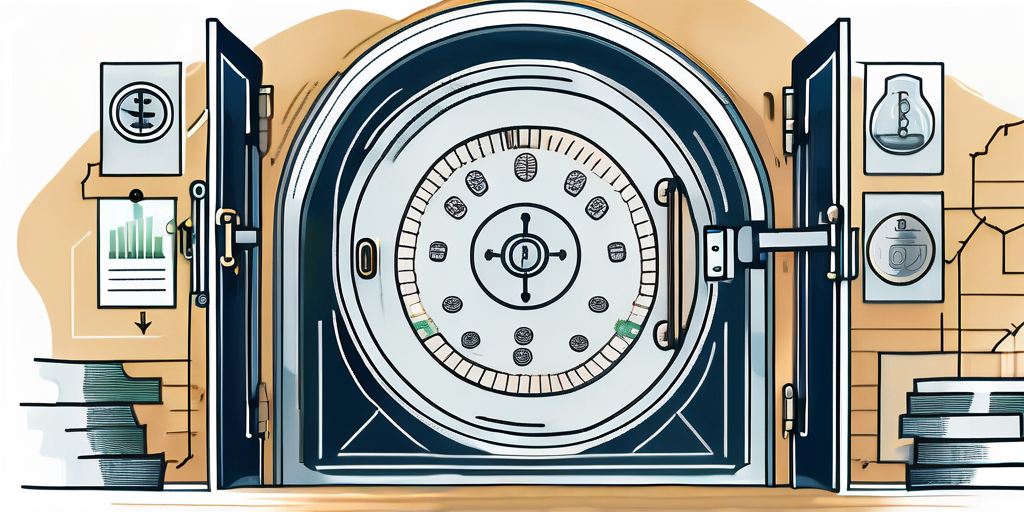
Who Oversees Hard Money Lenders?
Hard money lenders are typically private entities or individuals rather than traditional banks. As such, they are subject to different regulations depending on the jurisdiction in which they operate. Regulatory oversight may vary, but common governing bodies include state regulatory agencies and financial licensing authorities.
Compliance and Regulations in the Hard Money Industry
The hard money lending industry operates within a regulatory framework that governs lending practices, disclosure requirements, and consumer protection. Compliance with these regulations helps maintain transparency and ensure fair dealings with borrowers. Working with reputable lenders that uphold the necessary compliance standards is important.
Let’s take a closer look at some of the specific regulations that hard money lenders must adhere to. One key aspect is the requirement for lenders to disclose all terms and conditions of the loan to borrowers. This includes interest rates, fees, and potential penalties or charges. By providing this information upfront, borrowers can make informed decisions and avoid any surprises down the line.
In addition to disclosure requirements, hard money lenders must also comply with anti-discrimination laws. These laws prohibit lenders from discriminating against borrowers based on factors such as race, gender, religion, or national origin. This ensures that borrowers are treated fairly and have equal access to financing opportunities.
Furthermore, many jurisdictions require hard money lenders to obtain the necessary licenses and permits to operate legally. These licenses often involve a thorough vetting process to ensure that lenders are financially stable and have the expertise to provide loans responsibly. By working with licensed lenders, borrowers can have peace of mind knowing that they are dealing with reputable professionals.
Lastly, consumer protection is a top priority in the hard money lending industry. Some jurisdictions have implemented specific regulations to safeguard borrowers from predatory lending practices. These regulations may include restrictions on interest rates, fees limits, and lenders’ requirements to assess a borrower’s ability to repay the loan. By enforcing these regulations, authorities aim to protect borrowers from falling into cycles of debt and ensure that the lending process is fair and transparent.
How Hard Money Loans Work: A Comprehensive Guide
To understand hard money loans , it’s vital to grasp the process of obtaining and repaying these financing solutions. By familiarizing yourself with the ins and outs, you can navigate the lending landscape more confidently.

The Process of Obtaining and Repaying a Hard Money Loan
The process of obtaining and repaying a hard money loan typically involves several steps:
- Loan Application: Complete the necessary paperwork and submit your loan application, along with the required documentation.
- Property Appraisal: The lender will assess the property’s value through an appraisal conducted by a professional appraiser.
- Loan Approval and Offer: After evaluating the application and property valuation, the lender will determine if they can approve the loan. They will present the borrower with a loan offer outlining the terms, interest rates, and fees.
- Loan Agreement and Repayment: If the borrower accepts the loan offer, they will proceed to sign the loan agreement, which details the repayment schedule. The borrower is then responsible for repaying the loan according to the agreed-upon terms.
- Loan Termination: Once the borrower repays the loan in full, the loan is terminated, and the lender releases any liens on the property.
Key Features and Terms of the Requirements for Hard Money Business Loans
Hard money loans have unique features and terms distinguishing them from traditional loans. Familiarize yourself with these key elements to make informed decisions:
- Loan-to-Value Ratio: The LTV ratio determines the maximum loan amount a lender will provide based on the property’s value.
- Loan Term: Hard money loans have shorter terms compared to conventional loans. The length of the loan term can vary, typically ranging from six months to three years.
- Interest Rates and Fees: Hard money loans generally have higher interest rates and fees than traditional loans. The rates and fees vary depending on the lender, the borrower’s risk profile, and the loan’s specifics.
When it comes to hard money loans, it’s important to understand that the loan-to-value ratio is crucial in determining the maximum loan amount a lender is willing to provide. This ratio is calculated by dividing the loan amount by the property’s appraised value. For example, if the appraised value of a property is $500,000 and the lender has a loan-to-value ratio of 70%, the maximum loan amount would be $350,000.
In addition to the loan-to-value ratio, the loan term is another key feature of hard money loans. Unlike conventional loans that may have terms of 15 to 30 years, hard money loans typically have shorter terms. The length of the loan term can vary, but it’s common to see terms ranging from six months to three years. This shorter term allows borrowers to quickly secure project financing and repay the loan within a shorter timeframe.
Lastly, it’s important to consider the interest rates and fees associated with hard money loans. Due to their higher risk nature and the speed at which they are typically funded, hard money loans often come with higher interest rates and fees than traditional loans. The specific rates and fees can vary depending on the lender’s policies, the borrower’s risk profile, and the loan details. It’s crucial for borrowers to carefully review and understand these rates and fees before committing to a hard money loan.
Qualifying for a Hard Money Business Loan: What You Need to Know
Now that we have covered various aspects of hard money loans, it’s important to understand the requirements for hard money business loans. By meeting these requirements, you can increase your chances of obtaining the financing you need.
Essential Requirements for Hard Money Business Loans
When seeking a hard money business loan, keep these essential requirements in mind:
- Property Value: The property used as collateral must have enough value to support the requested loan amount. Lenders typically offer a percentage of the property’s value as the loan.
- Business Viability: Lenders will assess the viability and potential of your business. Demonstrating a robust business plan, financial projections, and industry knowledge enhances your chance of qualifying for a loan.
- Exit Strategy: Lenders need assurance that you have a clear exit strategy for repaying the loan, either through cash flow from the business or other means, such as refinancing.
Meeting these requirements for hard money business loansand having a comprehensive understanding of the hard money loan landscape can help position you for success in securing the financing needed for your business.
Let’s delve deeper into each of these requirements to gain a better understanding of what lenders look for when evaluating loan applications:
Firstly, property value is crucial in determining the loan amount you can secure. Lenders want to ensure that the property used as collateral has enough value to cover the loan in case of default. They typically offer a percentage of the property’s appraised value, known as the loan-to-value ratio. The higher the property’s value, the more favorable the loan terms may be.
Secondly, lenders assess the viability of your business. They want to see that your business has the potential to generate enough revenue to repay the loan. You must present a well-crafted business plan outlining your goals, target market, competitive advantage, and growth strategies to demonstrate this. Financial projections are also crucial, providing insight into your business’s expected cash flow and profitability.
Lastly, having a clear exit strategy is vital. Lenders want to know how you plan to repay the loan. This can be through the cash flow generated by your business or by refinancing the loan with a conventional lender once your business has grown. A well-thought-out exit strategy gives lenders confidence in your ability to honor your financial obligations.
By understanding these requirements in detail, you can prepare a strong loan application that addresses the concerns of potential lenders. Remember, securing a hard money business loan is not just about meeting the minimum requirements; it’s about presenting a compelling case for why your business deserves the financing. So take the time to gather all the necessary information and present it clearly and concisely.
frequently asked questions on requirements for hard money business loans
What are hard money business loans.
Hard money business loans are a type of financing provided by private lenders, not traditional banks. These loans are usually secured by real estate and are known for their fast approval times, flexible terms, and reliance on collateral rather than the borrower’s creditworthiness.
Who can qualify for a hard money business loan?
Businesses with tangible real estate assets need quick funding and might not qualify for traditional bank loans due to credit issues or other financial constraints but often qualify for hard money loans.
What collateral is required for a hard money business loan?
The primary collateral for a hard money loan is usually the real estate asset being financed. Depending on the loan’s specifics, lenders may also consider other assets or property types as collateral.
Is credit score a crucial factor in hard money loan qualifications?
While credit scores are considered, they are not as critical in hard money lending as in traditional bank lending. Hard money lenders focus more on the value of the collateral and the project’s potential profitability.
What are the typical interest rates for hard money business loans?
Interest rates for hard money loans are generally higher than those for traditional bank loans, reflecting the higher risk assumed by the lender. Rates vary widely depending on the lender, the property, and the specifics of the project.
How fast can I get a hard money business loan?
One of the advantages of hard money loans is their quick processing time. Loans can often be approved and funded within a few days to weeks, significantly faster than traditional bank loans.
What are the loan-to-value (LTV) ratios typically required for hard money loans?
Hard money lenders typically require lower LTV ratios, often between 50% to 70%, to reduce their risk, ensuring there is enough equity in the property should a foreclosure occur.
Can I get a hard money loan for a business startup?
Yes, startups can qualify for hard money loans if they have the necessary collateral and their business plan shows potential profitability. However, the terms might be stricter compared to established businesses.
Are there any prepayment penalties for hard money loans?
This varies by lender. Some hard money lenders charge prepayment penalties, while others do not. It’s important to review the terms of your loan agreement carefully.
How can I find a reputable hard money lender?
Research is key. Look for lenders with solid reputations, transparent terms, and a successful funded project history. Networking with other business owners or real estate professionals can also provide valuable recommendations.

Mark J. Kane, Founder & CEO of Sunwise Capital, is a distinguished entrepreneur with over 16 years in business financing. Beginning as a psychologist, he quickly became a trailblazing Hospital Administrator. Mark has built multiple ventures, notably accelerating a startup to $18M within months. His transition to Sunwise Capital stems from a deep-seated desire to empower business owners with strategic financial solutions. Recognized for his expertise, Mark's leadership at Sunwise Capital reflects his commitment to fostering business growth and success. Click the link to read more about the author.
Take Your Business Further With A Loan From Sunwise Capital
Apply in minutes to get funding, checking eligibility will not affect your credit score, give us a call we’d love to chat., 888-456-9223.
- en - english
- es - español
- > Business Finance
- > Article
The Ultimate Business Guide To Hard Money Loans

What Is A Hard Money Loan?
#DidYouKnow These loans are usually for financing commercial or investment properties.
How Do Hard Money Loans Work?
- Loan Amount. Hard money lenders tend to only lend a certain percentage of the property's current loan-to-value (LTV). This percentage can vary, but it's often around 60-70%.
- Repayment Term. These loans are usually for short periods, typically 1-3 years.
- Interest Rates. Because hard money loans are riskier than traditional loans, interest rates are typically higher than traditional mortgage rates.
- Speed. Because the approval depends on the property value rather than a lengthy credit check, the lender can sometimes distribute the funds within days of the loan request.
- Payments. These loans usually have interest-only payments, which means that you pay only the interest each month. Because of this, the monthly payments can be quite low, as they do not include any repayment of the principal loan amount. After the interest-only period, the loan becomes due in full. This means that the entire principal amount, along with any remaining interest, must be repaid in one sitting.
Risks Of Hard Money Loans
- The Cost. Hard money loans typically have much higher interest rates than traditional lenders. The ballon payment can also be hard to repay.
- Loss Of Property. If the borrower fails to repay the loan, the lender has the right to take possession of the property. This could result in a significant loss for the borrower.
- Dependence On Property Sale Or Refinance. The typical exit strategies are either selling the property or refinancing with a more traditional lender.
- Lending Regulations. Hard money lenders are not subject to the same regulations as traditional banks. This can sometimes lead to predatory lending practices.
The Pros And Cons Of Hard Money Loans
- Fast Approval. Unlike traditional lenders, who require extensive paperwork and a long approval process, hard money lenders can often approve and fund quickly.
- Credit Score is Not a Deciding Factor. They can be a good option for individuals or businesses with bad credit, as the approval depends more on the property value than the borrower's credit history.
- Flexible Terms. As they are typically issued by private investors or companies, they usually offer more flexibility in repayment terms, tailored to the borrower's situation.
- High-Interest Rates. Compared to traditional loans, hard money loans come with higher interest rates, increasing the overall cost of borrowing.
- Shorter Repayment Periods. These loans generally have a shorter repayment period, which could strain your cash flow if not properly planned.
- Risk of Losing Property. If you fail to repay the loan, you risk losing the property used as collateral, which can be a substantial loss.
- Large Down Payment. Hard money lenders usually require a significant down payment, which can be a hurdle for some borrowers.
How Do Businesses Use Hard Money Loans?
- To use like bridge loans
- Quick access to capital to take advantage of a time-sensitive opportunity
- To strengthen cash flow
- Land purchases
- Construction projects
Hard Money Loan Rates
Is a hard money business loan right for you.
- You're in urgent need of cash. One of the key benefits is the speed at which the lender can disburse the funds.
- You have a bad credit history. If your business has a poor credit history or is too new to have established credit, then you may have difficulty securing traditional financing.
- Your need is more short-term. These loans are usually designed for short-term needs, typically lasting around 12 months to a few years at most.
- You have an exit strategy to pay off the loan. This could be selling the property, refinancing to a traditional loan, or another source of cash flow. If there isn't a clear exit strategy, a hard money loan could lead to financial trouble.
- You don't mind the higher cost. Remember to calculate the total cost of the loan, including interest payments and any fees or penalties.
- You own a valuable asset. Hard money loans are often secured by the value of a property or other high-value assets.
- You can tolerate the risk. You need to assess the risk level involved. With a hard money loan, if you default on the loan, you risk losing the property or asset used as collateral.
How To Get A Hard Money Loan
Most common requirements.
- Credit Score. You need to have a good credit score to receive approval.
- Info On Your Finances. This usually comes in the form of bank statements.
- Property Value and Equity. The value of the property that acts as collateral is paramount. Lenders typically look at the property's after-repair value (ARV) or its current value to determine the loan-to-value (LTV) ratio.
- Down Payment. Many hard money lenders require a significant down payment to ensure the borrower's commitment.
- Proof of Funds. This shows that borrowers have the necessary funds to cover down payments, closing costs, and any other associated costs.
- Exit Strategy. Lenders want clarity on how you plan to repay the loan, such as through property sales, refinancing, or another viable method.
- Property Type. Whether it's residential, commercial, or another type of property, this can influence a lender's decision.
- Location. The location of the property, especially if it's in a high-demand area, can play a role in a lender's willingness to provide a loan.
- Rehab/Repair Budget. If you intend to renovate or repair the property, lenders will typically want a detailed breakdown of costs and plans.
- Personal Guarantee. Some lenders may require the borrower to offer a personal guarantee, holding them personally liable in the event of a default.
- Time In Business. If you're applying for a hard money commercial loan, lenders might want you to have been in business for a specific period.
How To Apply
- Evaluate Your Situation. First, ensure a hard money loan is the right fit for you. Do the pros outweigh the cons for your specific needs? Can you manage the hard money loan down payment and higher interest rates?
- Find A Lender. Look for one that specializes in hard money loans. Don't forget to research the lender's reputation and reviews.
- Apply For The Loan. You can begin the application process. This usually involves providing details about your collateral, your financial situation, and your plans for the loan.
- Undergo A Property Valuation. The lender will likely require an appraisal of the property you use as collateral to determine its market value.
- Review The Terms. If you receive approval, the lender will offer the loan's terms. Review these carefully, and consider seeking legal advice before signing anything.
- Close The Deal. If you agree with the terms, you can close the deal and receive the funds. Remember, make sure to plan your repayment strategy from the get-go!
Alternatives To Hard Money Loans
Equipment financing, invoice financing, private loan, home equity line of credit (heloc), commercial mortgage, government-backed loan programs, related articles.

When Were Credit Scores Invented? A Journey Through Financial History
Credit scores affect the financial health of both people and companies. Contrary to common belief, they are not a... Read More


Everything you need to know about DSCR: the debt service coverage ratio
The Debt-Service Coverage Ratio (DSCR) is a crucial indicator of financial health and stability. Understanding it can illuminate the... Read More

How Many Loans Can You Have?
When it comes to borrowing, knowing how many loans you can have and how much debt is too much... Read More

Payroll Loan Essentials: A Comprehensive Guide for Businesses
A payroll loan can serve as an essential lifeline when cash reserves are low, ensuring prompt payment to employees... Read More

Unveiling the Basics of Purchase Order Financing
Purchase order financing offers a funding solution for businesses to cover the costs of materials or products required to... Read More

Everything You Need To Know About Mezzanine Financing
Mezzanine financing is a key option for companies ready to grow but stuck between debt and equity. It blends... Read More
Prequalify in 5 minutes
Select your desired loan type.
- Business Credit
- Business Finance
- Entrepeneurship
- Business Managment
Latest Articles

The Best Money Saving Apps: 2024 Guide
Money-saving apps make managing your finances more effective and easy. They help you budget, save, and invest with just... Read More

What Is Financial Literacy? A Comprehensive Guide to The ABCs of Money
Financial literacy is a beacon of empowerment amidst economic uncertainty. This concept helps us understand the nuances of finances... Read More

The 3 Credit Bureaus: Their Reports And Credit Scores
Credit bureaus are responsible for managing the credit history of individuals and companies. This score is an important part... Read More

Compound Interest: A Guide to Long-Term Financial Growth
Did you know that compound interest can greatly affect a person’s long-term financial health for the better? This article... Read More
- Starting a Business
Our Top Picks
- Best Small Business Loans
- Best Business Internet Service
- Best Online Payroll Service
- Best Business Phone Systems
Our In-Depth Reviews
- OnPay Payroll Review
- ADP Payroll Review
- Ooma Office Review
- RingCentral Review
Explore More
- Business Solutions
- Entrepreneurship
- Franchising
- Best Accounting Software
- Best Merchant Services Providers
- Best Credit Card Processors
- Best Mobile Credit Card Processors
- Clover Review
- Merchant One Review
- QuickBooks Online Review
- Xero Accounting Review
- Financial Solutions
Human Resources
- Best Human Resources Outsourcing Services
- Best Time and Attendance Software
- Best PEO Services
- Best Business Employee Retirement Plans
- Bambee Review
- Rippling HR Software Review
- TriNet Review
- Gusto Payroll Review
- HR Solutions
Marketing and Sales
- Best Text Message Marketing Services
- Best CRM Software
- Best Email Marketing Services
- Best Website Builders
- Textedly Review
- Salesforce Review
- EZ Texting Review
- Textline Review
- Business Intelligence
- Marketing Solutions
- Marketing Strategy
- Public Relations
- Social Media
- Best GPS Fleet Management Software
- Best POS Systems
- Best Employee Monitoring Software
- Best Document Management Software
- Verizon Connect Fleet GPS Review
- Zoom Review
- Samsara Review
- Zoho CRM Review
- Technology Solutions
Business Basics
- 4 Simple Steps to Valuing Your Small Business
- How to Write a Business Growth Plan
- 12 Business Skills You Need to Master
- How to Start a One-Person Business
- FreshBooks vs. QuickBooks Comparison
- Salesforce CRM vs. Zoho CRM
- RingCentral vs. Zoom Comparison
- 10 Ways to Generate More Sales Leads
What Is a Hard Money Loan?

Table of Contents
Hard money loans are a common financing type in the world of private lenders. This type of funding is considered more flexible than what banks or other traditional lenders offer. Because hard money loans require borrowers to use their assets as collateral, private lenders are often more willing to work with borrowers with bad credit or more modest cash reserves.
Although hard money lending can give you faster access to cash, the process also comes with substantial risks. It’s vital to understand the pros and cons before accepting any money from a private lender.
Editor’s note: Looking for a small business loan? Fill out the questionnaire below to have our vendor partners contact you about your needs.
What is a hard money loan?
A hard money loan is a type of financing based on the value of some collateral, usually real estate, the borrower offers up. A private lender will offer a loan as a percentage of the asset’s appraised value.
“What a hard money loan does is allow a company or individual to turn a real estate asset to cash, which they could use for any legal business purpose they desire,” said Jon Hornik, chairman of the Private Lender Group. “It’s a way to convert a hard asset into cash.”
A significant benefit of hard money loans is that they don’t require the same underwriting criteria conventional lenders use. Conventional lenders, such as banks, look at the borrower’s credit score, debt-to-income ratio, revenue and other factors when reviewing a loan application. Although private lenders also look at these elements, the collateral’s value is the overriding factor for hard money loans.
“The focus is mainly on the value of the asset,” said Matt Cole, executive managing director at Silver Arch Capital Partners.
Asset-based lending is similar to hard money loans, but real estate is usually the collateral in hard money loans, while asset-based loans use other asset types.
How do hard money loans work?
Hard money loans are short-term loans backed by a collateral asset, typically some form of real estate. They are funded by a private investor rather than depositors at a banking institution. The private funding nature of the money provides lenders with more flexibility in deciding which loans to approve or deny.
When applying for a hard money loan, it’s essential to recognize that each private lender might have unique underwriting requirements. Two private lenders might handle a loan application in very different ways. However, a hard money loan generally comes back to the value of the collateral asset. You’ll request a percentage of the value of the collateral asset as a loan, which is known as the loan-to-value ratio.
Generally, lenders charge points (or 1 percent of the loan value each) that are due at the closing of the loan, as well as the principal and its interest. Depending on the loan’s terms, this can become quite expensive. Here’s a breakdown to simplify the process.
- Points: If a lender offers you $100, it might also charge points that are due when the loan closes. In this case, one point is equal to $1. Points essentially act as a fee for the lender above and beyond the interest it will make on the loan. Generally, the more points due at closing, the lower the interest rate, though your private lender may differ.
- Interest: Interest is the cost of money borrowed. You are required to pay interest throughout the life of your loan. When the loan reaches maturity, you will have paid back the principal value plus interest, as well as any points the lender charged. So, if the lender offered you $100 at a rate of 10 percent, you would ultimately pay back $110 when the loan reached maturity. On top of that, if the lender charged you five points due at closing, you also pay back an additional $5.
- Principal: The principal is the amount initially owed. In this example, it is $100. When the loan reaches maturity, you must have paid back the principal amount borrowed along with interest, as well as any points the lender charged.
So what do the terms of a typical hard money loan look like?
“Hard money lenders typically charge between 8 percent and 15 percent interest, which may depend on the credit history and experience of the borrower,” said Melanie Hartmann, owner of Creo Home Buyers. “The borrower’s relationship with the lender may also have an impact on the interest rate. Additionally, hard money lenders typically charge points that can either be paid upfront or added to the principal balance of the loan.”
Most hard money loans carry a 12-month term, but it’s not unheard of to find a two- to five-year term.
Do hard money loans require a down payment?
Some private lenders do require a deposit upon signing. The amount is generally based on the deal’s risk profile, including additional elements of the borrower’s history, such as their business credit score . The deposit could be 5 percent to 25 percent of the total value of the loan.
What should you use a hard money loan for?
Proceeds from a hard money loan can be used to fund any legal business purpose. These are some of the most common purposes.
- When you need to move quickly: If you come across a truly rare opportunity that requires funding immediately, a hard money loan can be a fast way to access cash.
- Working capital: A common use of hard money loan proceeds is for working capital put toward any number of business needs. This can include expenses such as renovations to the property, construction costs and equipment purchases.
- Bridge loan: If you know your funding will come through in six months, but you need cash in 30 days, you can treat hard money loan proceeds as a bridge loan.
- Debt payoff: Proceeds from a hard money loan can be used to pay off an existing obligation, such as another loan or a mortgage.
- Purchasing raw land: Traditional lenders are not keen to lend on raw land. Hard money loans can be used to purchase empty tracts you can then turn into your desired use.
How do you get a hard money loan?
When seeking a hard money loan, you’ll need to find a nonbank lender; traditional banks and credit unions don’t offer this kind of loan. A hard money loan lender could be a financial institution that isn’t deemed a complete bank or a direct lender specializing in this kind of funding.
Caleb Liu, owner of House Simply Sold, suggests going online to find a hard money lender. “Google is a decent place to start. There are a variety of nationwide hard money lenders. However, you should seek out hard money lenders that are active in your target market.”
Other ways to find hard money lenders include attending networking events, joining real estate investor clubs and asking for referrals. Because this type of loan requires you to pledge your assets as collateral, it’s critical to make sure the lender is legitimate and trustworthy.
Liu suggests asking these questions:
- What is the lender’s track record? Do you know someone who has closed with them? Are they familiar with and active in the local market? Is the hard money lender licensed?
- How many points will you be charged?
- For your interest rate, how much will you be paying each month? This is important because the rates for hard money loans are usually higher.
- Can the loan be extended if necessary? Are there fees? Will the interest rate increase?
- Are the payments interest-only for the duration of the loan, or will the principal be paid monthly as well?
- What is the maximum loan-to-value ratio? Does this cover only the acquisition, or does it cover the rehab costs as well?
- Is there a prepayment penalty?
- How long is the loan period?
- What happens if you can’t sell the property or come up with the cash before the loan is due? Will your credit score be impacted?
- How quickly can the hard money lender disburse the cash?
What are the pros and cons of hard money loans?
When you’re choosing a business loan , deciding between a bank loan and a hard money loan may come down to practicality factors, your timeline and your precise requirements. While evaluating your options for business lending, the following pros and cons can help steer you in the right direction.
The pros of hard money loans
Hard money loans offer several advantages to businesses in need of capital because they are:
- Faster to close: Traditional lending sources can take months to review and vet an application. A hard money loan can provide a business with much-needed capital quickly, making it an excellent option when time is of the essence. “Cash flow is like oxygen to businesses,” Hornik said. “Without cash flow, you go down pretty quickly. The liquidity provided by private lenders is key in some cases to businesses’ survival.”
- Easier to obtain: Hard money loans are funded without the strict underwriting criteria conventional lenders require, so they’re a business loan you can get with bad credit . This means most businesses can generally get the cash they need more easily and quickly than if they applied through a conventional lender.
- More flexible: Where traditional lenders may greatly detail how you can spend the loan proceeds, hard money lenders don’t have such restrictions. Loan proceeds can be spent on any legal business purpose.
The cons of hard money loans
Though hard money loans can help businesses land funds quickly and easily, they also come with some disadvantages like:
- Quick maturity: While many loans allow you to pay back over many years, hard money loans require repayment in a much shorter period. “One caution is … hard money loans have short maturity dates of one year or two years,” Cole said. “A lot of times, borrowers look for a loan, close a loan, and don’t realize that the day after they close is when they should be working on how to pay off that loan. There’s no time to waste. The expense of a hard money loan over a three- to four-year period will eat you up.”
- High interest rates: With average rates of 8 percent to 15 percent, you’ll pay much more for your funding. This also means that the longer the loan drags on, the more expensive it can be. “The terms and conditions associated with hard money loans usually entail high interest rates above 10 percent, high closing costs with many points, a draw schedule for completion of various phases of the construction, and oftentimes a prepayment penalty if the loan were to be paid off early,” said David Reischer, a real estate attorney and CEO of LegalAdvice.com.
- Possible restrictions: Since hard money loans are often used for short-term construction or rehabilitation projects, the lender has a vested interest in the “as-improved” value of the property. This means it might push you to meet strict deadlines for any project.
- Stiff penalties if you default: The lender has the right to foreclose on your collateral property and sell it to cover your debt, even if you’ve already completed considerable work on the property. “It is critical that you have a strategy to pay back a hard money loan and then execute that strategy flawlessly,” Hornik said.
Hard money loans are quick, flexible and relatively easy to secure, but it’s important to understand the fine print . Defaulting can mean the loss of the property you put up as collateral.
When should a business consider a hard money loan?
Since a hard money loan could end up costing you dearly if you can’t repay it within the short maturity window, why would you take one? There are good reasons why businesses take out hard money loans every day, and many successfully pay them back without incident.
Hard money loans and private money lenders typically serve businesses that fall into at least one of these categories:
Can’t get a conventional loan
A conventional lender must abide by strict underwriting requirements. A mediocre credit score or poor debt-to-income ratio can preclude businesses from obtaining a loan. Banks also typically cap the number of loans they’ll give to one individual or business entity. Hard money loans could be a way to secure more funding when you already have multiple conventional loans.
“If you have less-than-stellar credit, then hard money loans are great because the underwriting is based on the asset, not your credit history,” said Shawn Breyer, owner of Breyer Home Buyers. “Banks [also] limit the number of conventional loans that an individual can have at one time. Since hard money loans are not based on the individual, the number of loans is not restricted.”
Private lenders offering hard money loans have more approval flexibility because the money comes from private investors. Businesses that can’t get conventional financing often seek out private lenders instead.
Other options for businesses that can’t get a business loan conventionally include merchant cash advances , microloans and business equipment loans.
Need funding quickly
Many businesses that could land a conventional loan still go to private lenders because their application processes are much quicker.
“Most of the time with a hard money lender, you talk to a guy who, if he’s not writing the check himself, is a decision-maker for a group of people who are,” Cole said. “It cuts right to the chase.”
The typical conventional lender’s approval process can take several months. Private lenders often approve funding within a few days.
Want a short-term loan
Hard money financing is useful for construction and rehabilitation projects as well as real estate acquisition. A short-term hard money loan for these purposes lets you use the property as collateral and clear the debt from your books quickly. For businesses that want a short-term or small-dollar loan, hard money loans are more effective than conventional ones.
If you’re trying to finance a construction business, consider SBA loans, lines of credit or alternative lending sources.
Advice for businesses accepting a hard money loan
Never accept any loan, especially a hard money loan, without doing your due diligence first. Failure to repay has steep consequences, particularly when your property is on the line. Defaulting on a hard money loan opens you up to foreclosure, so take time to develop a loan repayment plan and stick to it.
Here’s some advice from the experts on accepting a hard money loan.
1. Avoid prepayment penalties.
Steep prepayment penalties basically run counter to the idea of a short-term loan. Make sure to review the loan agreement for any clauses regarding prepayment penalties. If these penalties are excessive, stay away. Better yet, find a hard money loan that doesn’t carry a prepayment penalty at all.
“The most critical thing to look for in a hard money loan is whether there is a severe and egregious prepayment penalty,” Reischer said. “The goal of a hard money loan is to act as short-term financing. As such, if there is a severe prepayment penalty were the loan to be paid off early, then it is usually an attempt by a hard money lender to lock a borrower into a high interest rate for a long period or otherwise suffer a punitive penalty.”
2. Understand the terms of the loan.
You should be clear on the loan’s key elements, including the interest rate, points (a fee of 1 percent of the loan value per point) the lender charges on the loan, and when you can make those payments (upfront or on top of the principal). Always be especially clear on the repayment schedule of the loan to avoid defaulting.
3. Plan multiple repayment options.
The best way to make a hard money loan work for you is to first plan how and when to repay it. Ground that plan in the terms and conditions of the loan agreement. Ensure you have multiple ways to manage the repayment amount if unforeseen circumstances impact one of your strategies.
“Have multiple exit strategies planned before starting the project,” said Cassie Villela, property manager for Silverbridge Realty. “For example, if a flipped home isn’t selling by a certain date, it can be rented out and then refinanced into a conventional loan.”
Hard money loans offer flexible financing at a steep cost
The benefits of a hard money loan are numerous for businesses that can’t get a conventional loan, need capital quickly or want a short-term loan. However, their high cost and short maturity windows could prove problematic for businesses unprepared to repay quickly. Failure to repay the loan could result in foreclosure, even if you’ve performed significant work on the property.
Hard money loans make sense for businesses that need fast capital or can’t access other types of financing, but preparation and smart financial habits are key to avoiding the major pitfalls of this type of lending.
Always consult an attorney and/or an accountant before accepting a loan. Maintaining relationships with knowledgeable professionals can help you protect your business from costly mistakes that could result in closure. Never sign a loan agreement without the advice of these professionals, and always have a clear-cut plan to pay back any borrowed money.
Alternatives to hard money loans
These alternative loan options can provide quick access to funds but with fewer or different potential drawbacks than with hard money loans.
Equipment financing
If you need equipment for your business and require help covering the cost, equipment financing may be a good option. The equipment you buy serves as collateral and you repay the loan over time with interest. This is an ideal option for a business that is looking to purchase machinery and can be easier to qualify for than a traditional business loan.
>> Learn More: The Ins and Outs of Farm Equipment Loans
Invoice factoring
A business with a large number of outstanding invoices and in need of immediate funds may want to use an invoice factoring company, which pays you for the invoice and collects payment from your client. For the services, the company will take out any interest or fees, and you will receive the remaining amount. The downside can be hidden fees as a result of working with the company. You can also only participate in invoice factoring if your client’s credit qualifies.
Short-term loans
If you are looking for a loan that does not rely as heavily on collateral, a short-term loan might be right for you. Similar to hard money loans, short-term business loans have flexible requirements, and many do not require you to have any physical collateral. If you have a good credit score and have been in business for at least six months, you may be eligible for this type of loan.
Sean Peek and Stella Morrison contributed to this article. Source interviews were conducted for a previous version of this article.

Get Weekly 5-Minute Business Advice
B. newsletter is your digest of bite-sized news, thought & brand leadership, and entertainment. All in one email.
Our mission is to help you take your team, your business and your career to the next level. Whether you're here for product recommendations, research or career advice, we're happy you're here!
BizFundingResource.com
Hard Money Lender Business Plan and SWOT Analysis
Hard Money Lender Business Plan, Marketing Plan, How To Guide, and Funding Directory
The Hard Money Lender Business Plan and Business Development toolkit features 18 different documents that you can use for capital raising or general business planning purposes. Our product line also features comprehensive information regarding to how to start a Hard Money Lender business. All business planning packages come with easy-to-use instructions so that you can reduce the time needed to create a professional business plan and presentation.
Your Business Planning Package will be immediately available for download after your purchase.
- Bank/Investor Ready!
- Complete Industry Research
- 3 Year Excel Financial Model
- Business Plan (26 to 30 pages)
- Loan Amortization and ROI Tools
- Three SWOT Analysis Templates
- Easy to Use Instructions
- All Documents Delivered in Word, Excel, and PDF Format
- Meets SBA Requirements
Real estate developers and real estate entrepreneurs are always going to need capital to complete their projects. Given that it is very difficult to obtain ongoing capital commitments from traditional financial institutions, many people turn to hard money lenders in order to get the short-term financing they need in order to complete a real estate project. For many real estate developers, this can be an expensive form of capital given that there are usually a significant amount of upfront fees, with a very high interest rate. Additionally, most hard money lenders only provide a loan-to-value percentage of 65% to 70%. This is mainly due to the fact that to a certain extent hard money lending is a risky investment activity. Many hard money lenders often source or capital from a number of private individuals from which they have a ongoing and pre-existing relationship. The barriers to entry for a new hard money lender are considered moderate given that most of these firms are required to have appropriate licensure in place to act as a mortgage brokerage. This is primarily in cases where residential mortgages are being provided. Startup costs, outside of raising capital, usually range from $50,000 to $150,000 covers the working capital, professional fees, licensure, and initial marketing costs that are required in order to watch this type of lending business.
A hard money lender business plan usually focuses on the closing fees and interest is charged to borrowers in exchange for the capital they need. A well formulated hard money lender business plan also has a three-year profit and loss statement, cash flow analysis, balance sheet, breakeven analysis, and business ratios page. Generally, the balance sheet should be completed by a CPA or an accountant that understands how hard money loans are valued. It should be noted that in some instances specialized corporate structures are used so that loans are held by a third-party entity and that by the hard money lender themselves.
A hard money lender marketing plan is required in order to market lending services to real estate investors, entrepreneurs, and developers. As it relates to marketing for investors, an attorney should be retained to make a determination as to how you can reach potential investors and marketing to the general public. Some states and the federal government have rules in regards to how investment vehicles can be marketed to potential investors. Usually, only people that are considered to be accredited investors can place a significant amount of money with a hard money lending business.
For a SWOT analysis for a hard money lender, dispenser that these businesses are generally able to thrive in any economic climate. There are always going to be real estate opportunities that require very fast lending decision so that they can be completed. Additionally, the gross margins generated from interest fees and closing fees are extremely high. As it pertains to weaknesses, there are a number of regulatory requirements must be adhered to at all times when a person engages in hard money lending. Also, there are significant competitive issues that must be dealt with. Relating to opportunities, most hard money lenders expand their business operations by acquiring additional rounds of capital to provide a larger number of loans. For threats, changes in the underlying interest rate as well as regulatory changes pertaining to lending can have a negative impact on a hard money loan business.
In closing, hard money lenders are one of the oldest types of lenders within the United States. They are always going to be in demand given that there is a substantial amount of real estate within the United States, and there are always going to be developers and entrepreneurs that want to capitalize on potential opportunities.

How to Start a Hard Money Lending Business
Hard money lending is a topic that’s on a lot of lips these days and rightfully so.
In today’s economic climate, people need quick ways to access cash and don’t always have the time or credit to seek loans through a traditional bank. More and more, people are accessing funds through private lenders. That means a growing demand for the people who connect the investors with the consumers. Enter the hard money lending business . Hard money lenders secure funding from companies and individuals who want to invest. Then, they match those up with borrowers who are looking to fund their projects. If you’re interested in learning how to start a hard money lending business, you’re in the right place. This article will cover the basics of hard money lending, the pros and cons of becoming a hard money lender, and steps you can take to start your own hard money lending business.
By the end, you should have a good idea of whether or not hard money lending is right for you. We’ll also take a look at some of the most common questions people have when they’re interested in hard money lending.
What is Hard Money?
Depending on what part of the financial sector you’re in, hard money is defined in different ways. So as not to be confusing, we’ll use the definition that fits with hard money lending. That is, hard money is money that is secured by a physical asset’s value. That asset could be real estate property, heavy equipment, vehicles, and inventory. A loan is made based on the assessed value of that asset and the borrower usually receives a percentage of that value in a lump sum. The asset then becomes collateral for the loan. So, if the borrower is unable to satisfy the loan terms, the lender can take possession of the building, vehicle, or equipment that was valued to recoup their costs.
Hard money loans are attractive to borrowers because they’re often easier to get. Because the funds are secured by physical property, borrowers don’t have to worry as much about having a negative credit history. Hard money loans are often a fast solution to immediate cash needs. Private lenders don’t have to operate under the same restrictions as traditional banks do. So, they don’t usually require as much documentation and paperwork, shortening the application approval process. Hard money loans are also a great stop-gap for borrowers who are awaiting other, longer-term loans to come through.
Borrowers who seek hard money loans so they can fix and flip real estate property are a boon for hard money lenders. Since residential real estate properties are flying off the market faster than they have in the past – down to 36 days on the market from 44 the previous year – buyers can’t afford to sit around waiting. Competition for new homes on the market is fierce. So, it’s beneficial for them to be able to access fast cash when they need it to get a hold of that property before someone else does. Hard money loans give them what they need when they need it. Since they’re not staying with the property long term, they can repay the loan in the shorter term typical of a hard money loan.
As an investor, hard money loans are a good financial proposition. Realizing a return on investments is not dependent upon the creditworthiness of the borrower. In some cases, it’s preferable to have the borrower default on the loan and collect the property because the investor may realize higher returns. That’s not to say that investors encourage or desire failure on the loan, but this security makes hard money investing less risky and therefore more attractive. Because hard money loans typically carry a shorter term than traditional loans, investors see their returns faster.
Where hard money lenders come into the picture is connecting people who need money with the people who have it. It’s not easy for a borrower to find someone with the capital to lend them. They can’t just walk into a corporation or a wealthy individual’s home with their hand out. It takes time to build relationships with lenders who want to invest their money. The average buyer not only lacks the skills or access to these investors but usually has no reason to develop these relationships for a one-time transaction.
Hard money investors often either don’t have or don’t want to expend the resources to vet every possible borrower. They would need to not only invest their funds, but also invest in marketing, assessments, valuations, application processing, and financial verifications. It’s like starting a whole new business just to take care of the lending piece. A lot of these investors are interested in making money but don’t care to spend resources dedicated to lending. Their primary interests lie in the business they earned their money from in the first place.
This is where the need for an intermediary arises. This is where you, as a hard money lender, would step into the picture. You help investors more easily find borrowers and borrowers more likely to find investors. On the investing side, you handle identifying potential opportunities, filing paperwork, investigating assets, and vetting borrowers. On the borrowing side, you provide access to funds that would otherwise be inaccessible. You provide a central contact place for multiple funding sources and offer advice on how to best manage the loan.
That’s the big picture of hard money lending and what a hard money lending company does. There’s a lot more to explore. If becoming a hard money lender still intrigues you, read on to get more in-depth on the advantages and disadvantages of hard money lending.
Hard Money Pros and Cons
One very attractive feature of becoming a hard money lender is that you can make a living investing someone else’s money. That’s not to say that it doesn’t take any investment of your own capital to start a lending business, but most of your income will come from using investors to generate business. This means you can get into real estate and financial sectors without needing to have accumulated a tremendous amount of wealth yourself.
Since you are essentially a broker between the investors and the borrowers, you get paid upfront. You’re not usually the one investing in the loan. So, you have less risk than the lender does. If a deal goes bad, it’s your reputation on the line, but not necessarily your finances. You’re not responsible for paying the loan back to the lender.
Another advantage of getting into this business is that hard money lenders aren’t subject to the same set of rules and restrictions that banks are. Generally, that means you don’t have as much red tape to cut through and can negotiate more flexible loan terms. Hard money loans are usually processed and approved in a month or so. Shorter processing times can mean doing more business faster and making more connections.
You don’t have to be involved with real estate to be a hard money lender either. Hard money loans can be based on other assets like machinery, inventory, vehicles, and even shares in a company. This gives you a chance to diversify your business so that if the housing market takes a downturn, you aren’t reliant on it to bring in funding.
Hard money loan brokers generally operate on the local level. Having relationships with investors and knowing the local housing markets are both very important to the success of the business. With a startup staff, it can be difficult to build these relationships nationwide or to accurately read the ups and downs of the market. While this can be a very positive thing, it also means there’s more riding on local reputation.
Let’s be realistic. It’s not easy to be a startup company. Even though you don’t have to have an advanced degree or a banking background to start a hard money lending business, you do have to have a strong knowledge of financing and operations. Many of the qualities you need to be a hard money lender are the same as what you need to succeed in other startup businesses: hard work, networking, dedication, and planning.
A few startup numbers: According to the U.S. Bureau of Labor Statistics , about 20% of new businesses fail in their first year. After five years, that survival rate goes up to 50%. That means that only half of the businesses that started five years ago are still operating this year. At ten years, the percentage has fallen to 30% or roughly a third of all startups. Those numbers encompass all of the country’s startups, regardless of the type of business. The biggest growing business right now is healthcare. Transportation and construction, however, aren’t looking so good. What’s the most common reason startups fail? Failing to meet customer needs. That’s not startling, considering you already know you need customers to succeed.
Don’t expect to open your doors and immediately be flooded with borrowers. Both investors and borrowers care about their money. They want to trust the company they’re doing business with. So much of this business is done by word of mouth and referrals that you need to maintain important connections. Once you have an established reputation, things should get easier, but it can be hard starting as an unknown.
Hard money lending is regulated at the state level. To operate legally, you’ll have to know what your state’s rules are and abide by them. Should you decide to relocate, you’ll have to understand and satisfy a new set of rules. If your business is located near a state line, you’ll probably want to do business in both states. In that case, you’ll have to satisfy two sets of rules at the same time.
Are you a good fit for this industry?
Take a PROFITABILITY ASSESSMENT to find out.
When meeting a potential new referral partner you start by
Are you more likely to see
For long term business success you should focus on
Is it usually better to start a conversation by
In conversations do you focus more on
When thinking of my current income and free time:
My current employment is
When you face failure or a set back are you more likely to
Are you more driven to
Are your colleagues more likely to describe you as

Starting A Hard Money Loan Business
If you’re not discouraged by the statistics and are the kind of person who enjoys a challenge, getting into the hard money loan business could be a good choice for you. For someone good at networking, already has a strong connection with real estate, and understands what borrowers and investors are looking for, hard money loans can make you some money. The good news is that people always need money and people always want to make more of it.
Here are a few steps to help you get started in the hard money lending business.
Step 1: Establish yourself officially as a business. That means going through the process of incorporating or becoming an LLC. You’ll have to register your business and apply for a tax identification number from the IRS. You might also need one from the state or states you plan to work in.
Step 2: Obtain the right licenses and permits. The fastest way to get your business shut down is to fail to get the right permissions. Make sure you’re transparent about them once you do have them. This will lend your business some credibility and legitimacy.
Step 3: Establish a business account and keep your personal finances separate. It’s easy to get in hot water when you don’t make a clear separation between what you own and what the business owns. Having a dedicated bank account for your business makes that a thousand times easier.
Step 4: Get insurance to protect the business. In some cases, insuring your company is a requirement of maintaining your license. You also want to have protections in place to cushion you from the unexpected. If you’re operating out of a brick and mortar office, you need to have the building insured as well.
Step 5: Contact an attorney. Even if you’re an investment genius, you might not be a litigation expert. There’s a reason that attorneys have to go through rigorous education and exams. The law is a full-time pursuit that takes special training to fully understand. Hiring someone to make sure you have your legal ducks in a row is highly advisable.
After that, some good thing to keep in mind are:
Word of mouth is the best way to build a business. This means you need to treat people fairly and burn as few bridges as possible. If you haven’t already established a network with lenders and other brokers, there are business groups you can join that not only boost your numbers but give you a chance to meet others in the industry for advice and referrals.
Find a niche to operate in or, rather, a focus. Diversification is indeed important, but you can’t market to everyone all the time. If you specialize in securing funding for minority-owned small businesses or real estate loans for non-profits, focus on becoming the best in that niche. This way you can hone in on the needs of that specific group and how you can meet them better than anyone else.
Make referrals to other brokers. It might seem like this is giving business away, but it’s quite the contrary. As mentioned above, you can’t fill every niche yourself. Other brokers might be better at something than you are. Sending customers that fit their business over to them encourages them to return the favor and you’re still helping your customer. Both are solid reputation builders.
Be as transparent as possible. Integrity is essential in the hard money business. Don’t pretend to have experience or resources that you don’t or make claims you can’t back up. You want a reputation as trustworthy and dependable, not as a scam.
Loan Broker Industry Orientation
Hard money faqs.
There are some common concerns for those looking to get into the hard money lending business. After all, you want to be armed with as much info as you can get to succeed, right? Below are some frequently asked questions concerning starting your own hard money lending business.
Q. Do I need my own money? The answer is yes and no. You could start with a hard money loan yourself or find an investor to give you the funds upfront. For the licensing, permits, and insurance, you may have to initially invest your own capital.
Q. Do I need a degree? Unless your state requires it, you don’t necessarily need an advanced degree, but it helps. You can also start as an intern to learn about the business that way. Strictly speaking, you can have the knowledge you need without the degree. It does affect the perception of your qualifications, however. If you can show that you know your stuff, that’s sometimes all you need.
Q. How do hard money lenders make money? According to the job search site, Simply Hired , the average loan broker’s salary is $83,686 per year. The highest salary measured in their survey was $195,496. So, how do they do it? Lenders make money on commissions paid by the investors, fees paid by the borrowers, or both.
Q. How is a hard money lender different from a bank? Banks have to operate under very strict conditions to be compliant with federal laws. That makes the application process more restrictive and the loan terms less flexible. Bank loans generally have lower interest rates, but longer repayment periods. Their lending criteria are based on the borrower’s creditworthiness and the loans are long term.
Q. What gives one hard money lender an edge over another hard money lender? There is certainly competition in the hard money lending game. The more successful lenders will have better customer service, be able to lend money faster, and have lower interest rates than their counterparts.
Q. What is the average interest rate for a hard money loan? There is no national standard interest rate for hard money loans. They vary by region and lender, but they’re typically between 7% and 15% of the principal.
Q. What are points on a loan? Points are a way for borrowers to pay lenders for a lower interest rate. Borrowers can pay a certain amount of interest upfront for a point. Each point they buy lowers the interest rate by a percentage.
The hard money lending business isn’t always easy, but it can come with great rewards. Following the guidelines in this article should give you a good start on understanding the business and starting your own. Remember that trust and transparency are important for your professional reputation and that most deals are done from that reputation. So, keeping up compliance with government regulations, being open about your rates and procedures, and responding to customer demands appropriately are essential to your success. There will always be someone who’s been in the business longer. Don’t be too proud to ask for advice and mentorship from them.
With hard work, dedication, and a little luck, you’ll be brokering hard money loans with ease and realizing great returns on your new business.

Contact the Commercial Loan Broker Institute
Learn about our comprehensive business loan broker program.
If you are interested in receiving affordable loan broker training on your terms, contact the Commercial Loan Broker Institute. We can make specific accommodations for your schedule, the speed at which you learn and your location. We provide intensives, weekends, a virtual academy and one-on-one coaching support to new and established loan brokers. A dedicated coach will provide you with full support throughout the process to make learning easier for you. We can also provide you with a package of useful tools that will make it easier to run your firm effectively.
You don't need to start your loan broker business alone!
Our comprehensive broker launch program includes training, marketing, an instant lender network, and ongoing coaching and support.
We earn commissions if you shop through the links below. Read more
Money Lending Business
Back to All Business Ideas
How to Start a Money Lending Business
Written by: Carolyn Young
Carolyn Young is a business writer who focuses on entrepreneurial concepts and the business formation. She has over 25 years of experience in business roles, and has authored several entrepreneurship textbooks.
Edited by: David Lepeska
David has been writing and learning about business, finance and globalization for a quarter-century, starting with a small New York consulting firm in the 1990s.
Published on June 15, 2022 Updated on March 13, 2024

Investment range
$8,550 - $18,100
Revenue potential
$72,000 - $300,000 p.a.
Time to build
3 – 6 months
Profit potential
$58,000 - $120,000 p.a.
Industry trend
“Neither a borrower nor a lender be,” Shakespeare warned. Yet many have ignored his advice and today non-bank loans represent a $7 billion US industry. You could make good money with your own money lending business, as you’ll charge a higher interest rate and fees than those charged by banks because of the additional risk involved.
But before you start searching for investors, you’ll need to understand the process of launching a business. Luckily, this step-by-step guide has all the information you need to put you on the road to entrepreneurial success as a lender.
Looking to register your business? A limited liability company (LLC) is the best legal structure for new businesses because it is fast and simple.
Form your business immediately using ZenBusiness LLC formation service or hire one of the Best LLC Services .
Step 1: Decide if the Business Is Right for You
Pros and cons.
Before we get into the details, it’s important to clarify the type of business under discussion. Money lending businesses provide capital to individuals, generally those who cannot qualify for traditional bank loans. Money lending businesses can be structured in a number of ways:
- Private Lending – With a private lending company, you’d be lending your own personal funds to individuals, either unsecured or secured by collateral.
- Hard Money Lending – You would form relationships with money brokers and investors who would put up capital for you to use to make loans. The brokers or investors will take the interest earned and you would charge borrowers a loan fee.
- P2P Lending – Peer-to-peer lending is usually online and is basically a money lending app that connects individual lenders and borrowers. The P2P lending company usually takes a fee for the loan service.
This article will focus mainly on a hard money lending business, which requires much less capital to start. Even so, starting a money lending business has pros and cons to consider before deciding if it’s right for you.
- Good Money – Make 3-5% of each loan up front
- Flexibility – Run your business from home
- Large Market – Customers can be anywhere
- Build Relationships – Takes time to find investors, clients
- Attorney Fees – Need a prospectus for investors, plus loan documents
Money lending industry trends
Industry size and growth.
- Industry size and past growth – The US installment loan industry was worth $6.7 billion in 2021 after declining 1.3% annually over the previous five years.(( https://www.ibisworld.com/united-states/market-research-reports/installment-lenders-industry/ ))
- Growth forecast – The US installment loan industry is projected to continue to modestly decline over the next five years.
- Number of businesses – In 2021, 19,551 installment loan businesses were operating in the US.
- Number of people employed – In 2021, the US installment loan industry employed 106,935 people.
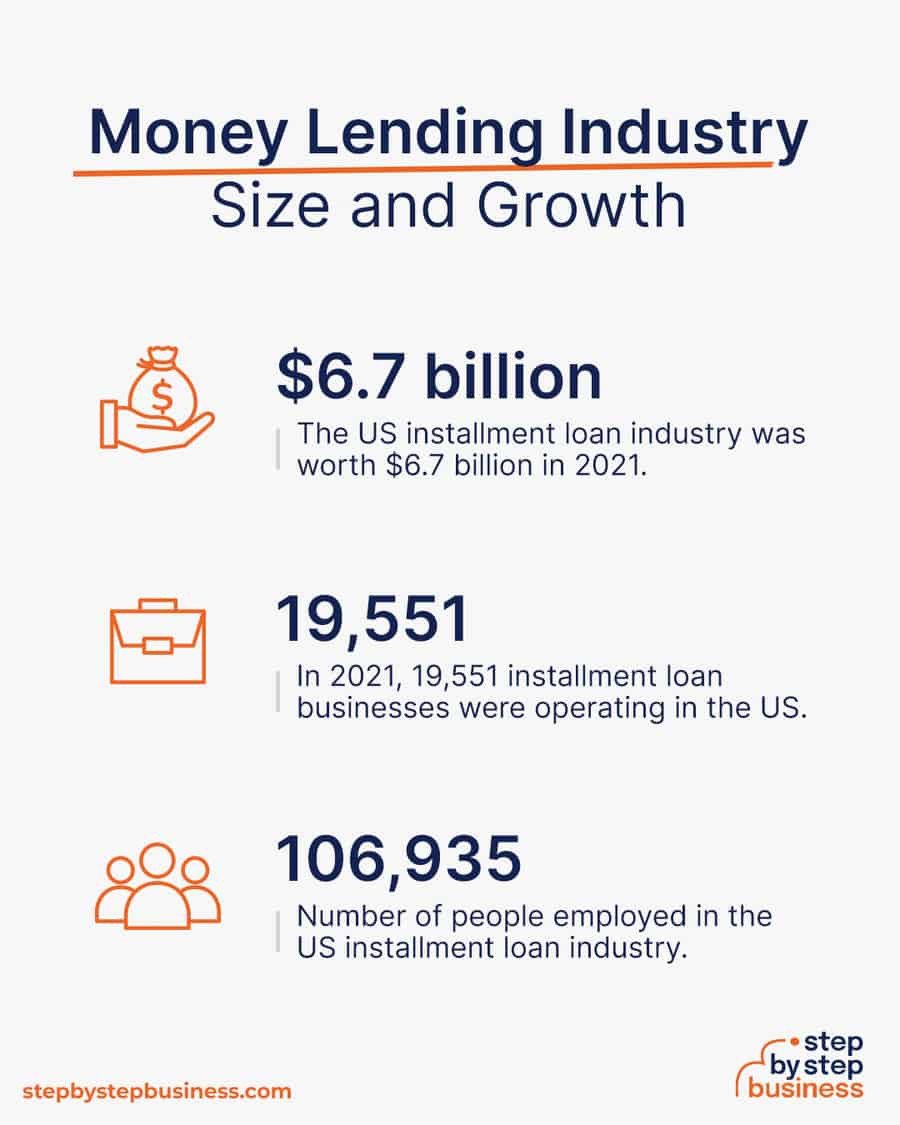
Trends and challenges
Trends in the money lending industry include:
- Hard money loans are growing in size and more often used for home purchases. This means higher fees for hard money lenders.
- More and more cross-border hard money loans are being made due to investors wanting to expand their reach globally.
Challenges in the money lending industry include:
- Money lenders have come under much scrutiny for alleged predatory lending practices and the high rates and fees they charge.
- Regulations are continuously tightening on money lenders, creating obstacles to doing business.
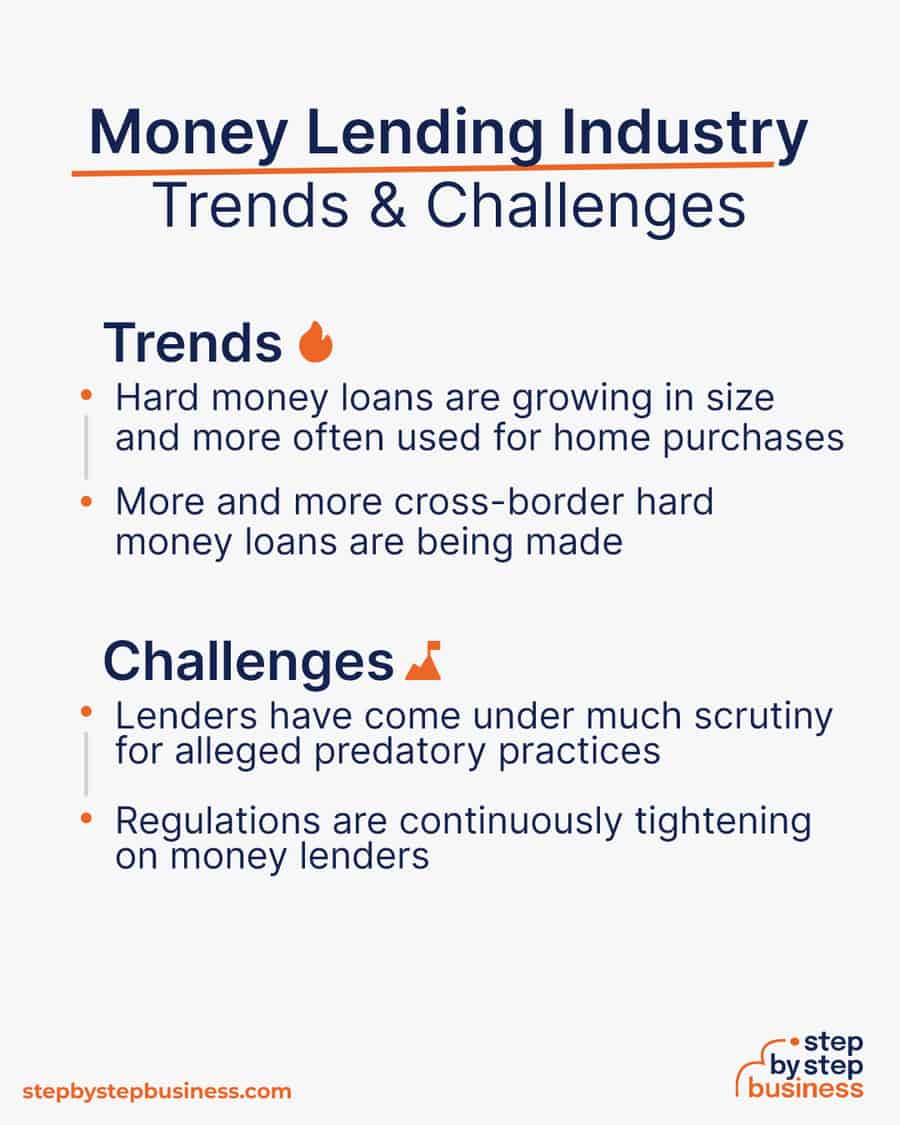
Demand hotspots
- Most popular states – The most popular states for lenders are South Dakota, Minnesota, and Michigan.(( https://www.zippia.com/lender-jobs/best-states/ ))
- Least popular states – The least popular states for lenders are Indiana, Tennessee, and Virginia.
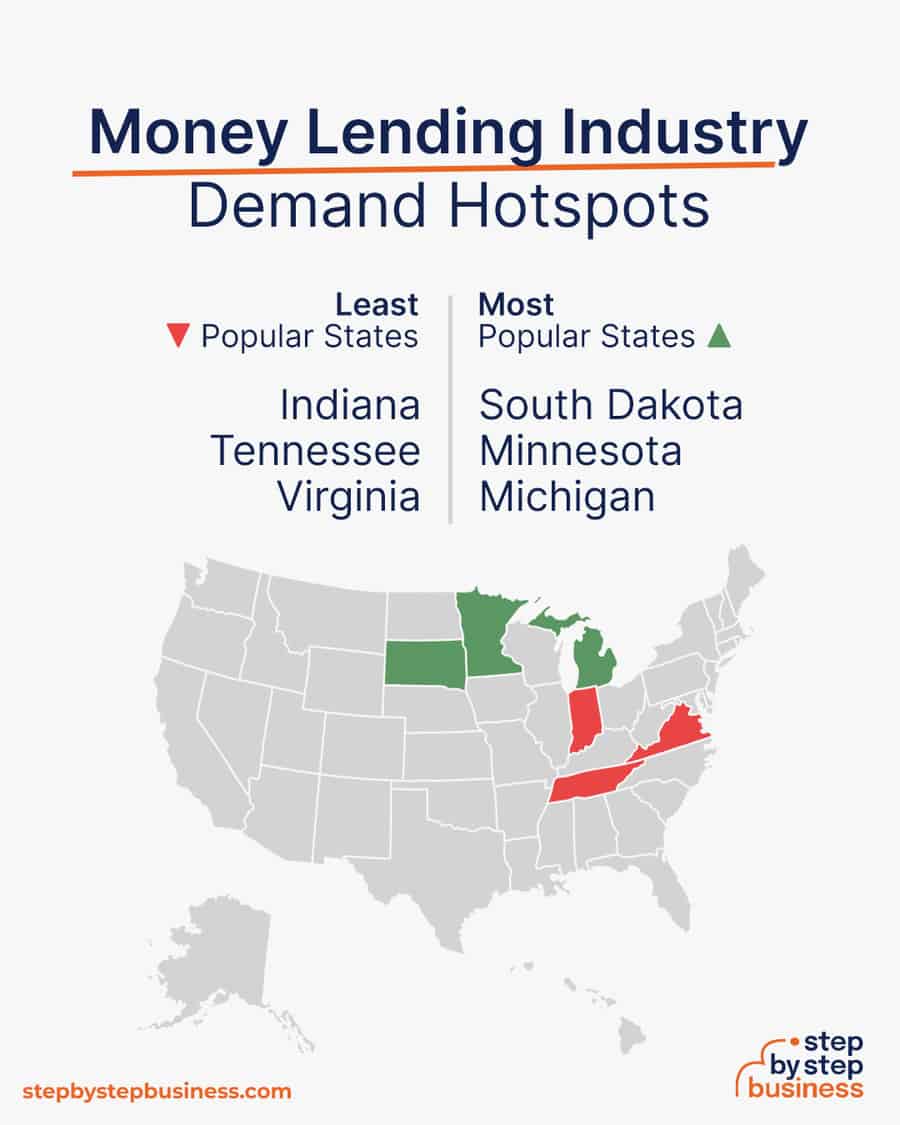
What kind of people work in money lending?
- Gender – 50.8% of lenders are female, while 49.2% are male . (( https://www.zippia.com/lender-jobs/demographics/ ))
- Average level of education – The average lender has a bachelor’s degree.
- Average age – The average lender in the US is 44.9 years old.
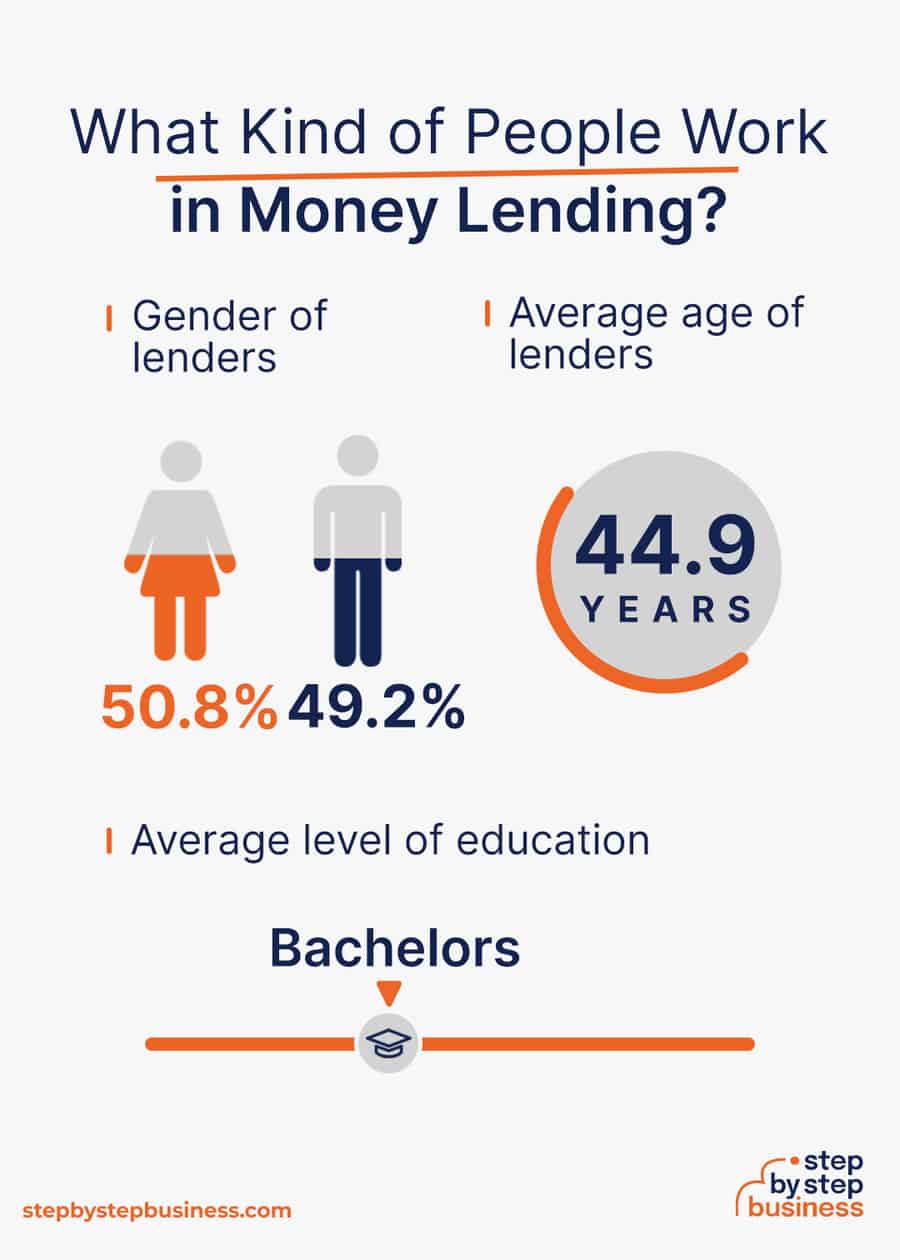
How much does it cost to start a money lending business?
If you decide to start a hard money lending business, your startup costs will range from $8,000 to $18,000. The largest cost will be attorney fees. You will need a prospectus to give to potential investors detailing how you will do business and how they will get a return on their investments. Such documents are complicated and costly. You’ll also need a website and a marketing budget.
How much can you earn from a money lending business?
Hard money lenders typically take a 3% to 5% fee of the total loan amount. Since a large portion of the loans you make will be for homes, these calculations will assume an average loan amount of $150,000, which would give you an average fee of $6,000 per loan.
The interest paid on the loans will go to the investors. Your profit margin should be high, at around 80%. In your first year or two, you could do 12 loans a year, bringing in $72,000 in annual revenue. This would mean $57,600 in profit, assuming that 80% margin.
As you build a reputation, you could increase that number to 50 loans a year. At this stage, you’d rent a commercial space and hire staff, reducing your profit margin to around 40%. With annual revenue of $300,000, you’d make a handsome profit of $120,000.
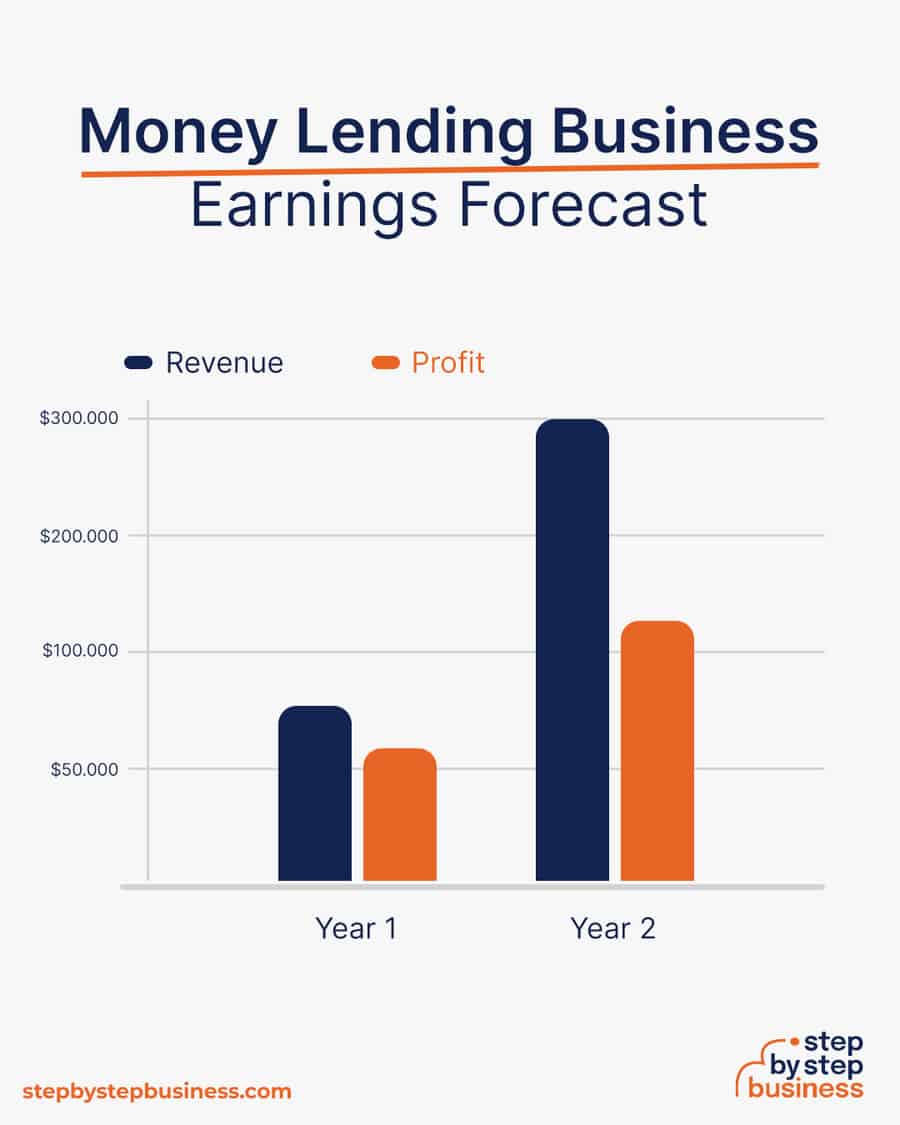
What barriers to entry are there?
The only barrier to entry for a money lending business is building relationships with investors, which often takes a lot of networking and leg work.
Related Business Ideas
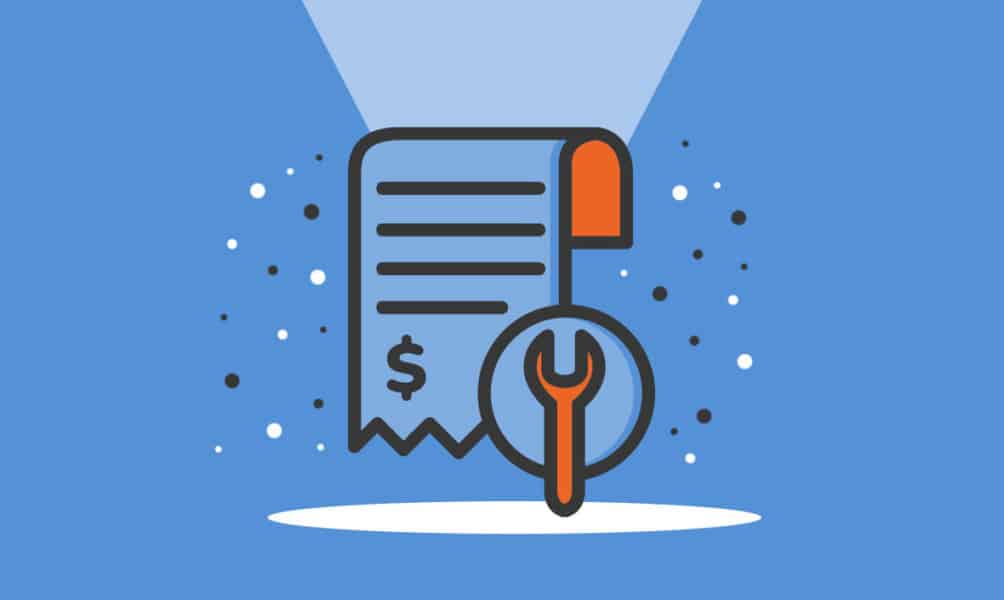
How to Start a Credit Repair Business

How to Start a Check Cashing Business

How to Start a Finance Company
Step 2: hone your idea.
Now that you know what’s involved in starting a money lending business, it’s a good idea to hone your concept in preparation to enter a competitive market.
Market research will give you the upper hand, even if you’re already positive that you have a perfect product or service. Conducting market research is important, because it can help you understand your customers better, who your competitors are, and your business landscape.
Why? Identify an opportunity
Research money lending businesses in your area to examine their products and services, price points, and customer reviews. You’re looking for a market gap to fill. For instance, maybe the local market is missing a micro lending company or a money lender that will provide a business line of credit.
You might consider targeting a niche market by specializing in a certain aspect of your industry, such as term loans for those with bad credit, or hard money startup loans.
This could jumpstart your word-of-mouth marketing and attract clients right away.
What? Determine your products or services
You’ll need to determine what types of loans to offer, and how you will evaluate credit scores to determine whether to make the loans. You’ll need to lay out specific lending criteria in your investor prospectus.
As far as the types of loans, you can offer mortgage loans, business loans, personal unsecured loans, car loans, or lines of credit.
How much should you charge for money lending?
Hard money lenders typically take a 3% to 5% fee of the total loan amount. The interest paid on the loans will go to the investors. The interest rates you charge will depend on the interest rate limits in your state. Working alone, your profit margin should be high, at around 80%.
Once you know your costs, you can use this Step By Step profit margin calculator to determine your mark-up and final price points. Remember, the prices you use at launch should be subject to change if warranted by the market.
Who? Identify your target market
Your target market will generally be anyone with bad credit who needs a loan. You should market on TikTok, Instagram, Facebook, and even LinkedIn, which is also a good way to connect with potential investors.
Where? Choose your business premises
In the early stages, you may want to run your business from home to keep costs low. But as your business grows, you’ll likely need to hire workers for various roles and may need to rent out an office. You can find commercial space to rent in your area on sites such as Craigslist , Crexi , and Instant Offices .
When choosing a commercial space, you may want to follow these rules of thumb:
- Central location accessible via public transport
- Ventilated and spacious, with good natural light
- Flexible lease that can be extended as your business grows
- Ready-to-use space with no major renovations or repairs needed
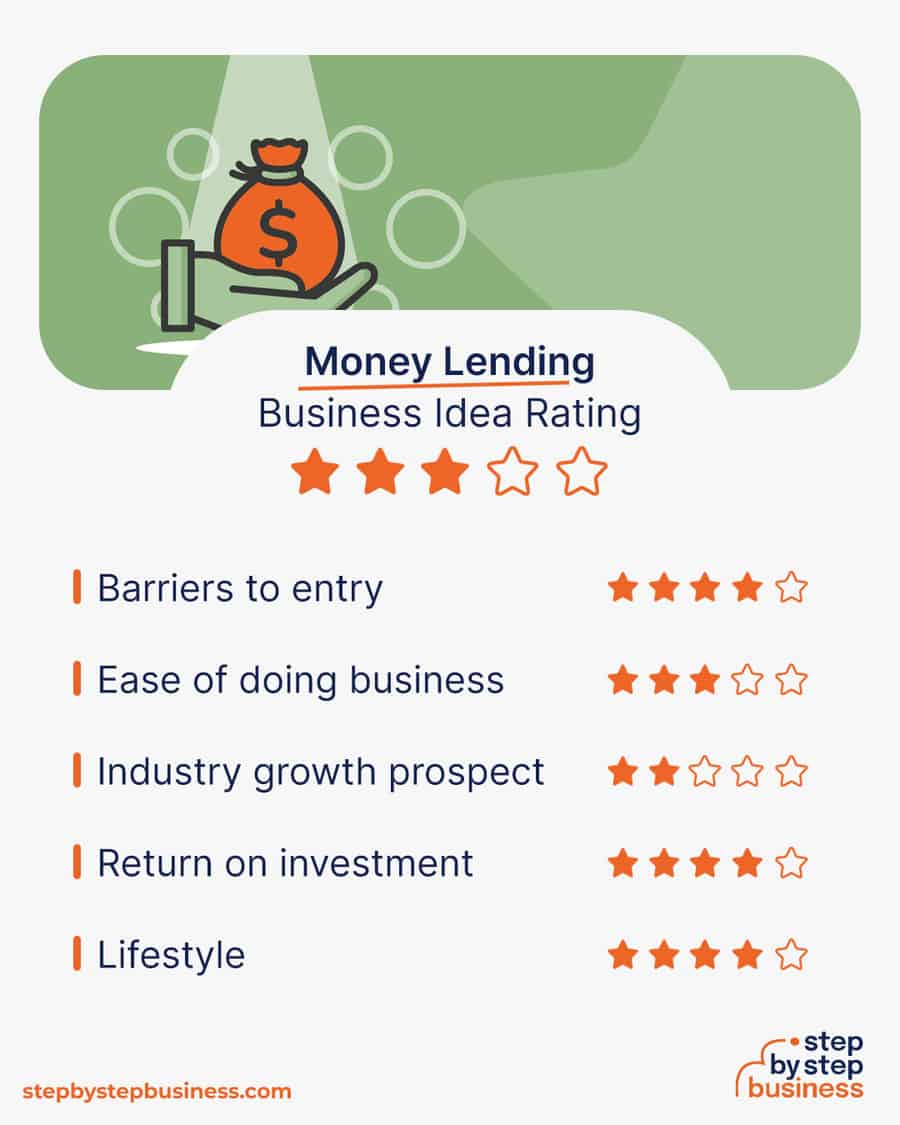
Step 3: Brainstorm a Money Lending Business Name
Your business name is your business identity, so choose one that encapsulates your objectives, services, and mission in just a few words. You probably want a name that’s short and easy to remember, since much of your business, and your initial business in particular, will come from word-of-mouth referrals.
Here are some ideas for brainstorming your business name:
- Short, unique, and catchy names tend to stand out
- Names that are easy to say and spell tend to do better
- Name should be relevant to your product or service offerings
- Ask around — family, friends, colleagues, social media — for suggestions
- Including keywords, such as “money lending” or “hard money loans”, boosts SEO
- Name should allow for expansion, for ex: “Instant Money Solutions” over “Home Sweet Loan”
- Avoid location-based names that might hinder future expansion
- Use online tools like the Step by Step Business Name Generator . Just type in a few keywords and hit “generate” and you’ll have dozens of suggestions at your fingertips.
Once you’ve got a list of potential names, visit the website of the US Patent and Trademark Office to make sure they are available for registration and check the availability of related domain names using our Domain Name Search tool. Using “.com” or “.org” sharply increases credibility, so it’s best to focus on these.
Find a Domain
Powered by GoDaddy.com
Finally, make your choice among the names that pass this screening and go ahead with domain registration and social media account creation. Your business name is one of the key differentiators that sets your business apart. Once you pick your company name, and start with the branding, it is hard to change the business name. Therefore, it’s important to carefully consider your choice before you start a business entity.
Step 4: Create a Money Lending Business Plan
Every business needs a plan. This will function as a guidebook to take your startup through the launch process and maintain focus on your key goals. A business plan also enables potential partners and investors to better understand your company and its vision:
- Executive Summary: A brief summary of the business plan, highlighting its key points and objectives.
- Business Overview: An overview of the money lending business, including its mission, vision, and legal structure.
- Product and Services: Details about the types of loans or financial services offered, including terms, interest rates, and eligibility criteria.
- Market Analysis: An examination of the target market, including size, demographics, and trends, to identify potential customers.
- Competitive Analysis: Evaluation of competitors in the lending industry, assessing their strengths and weaknesses.
- Sales and Marketing: Strategies for attracting and retaining customers, including advertising and promotional efforts.
- Management Team: Introduction to the individuals leading the business, highlighting their qualifications and roles.
- Operations Plan: Information on day-to-day operations, such as loan application processing, risk management, and customer support.
- Financial Plan: Projections for revenue, expenses, and profitability, as well as funding requirements and financial forecasts.
- Appendix: Supporting documents, such as legal agreements, market research data, or additional information to enhance the plan’s credibility.

If you’ve never created a business plan, it can be an intimidating task. You might consider hiring a business plan specialist to create a top-notch business plan for you.
Step 5: Register Your Business
Registering your business is an absolutely crucial step — it’s the prerequisite to paying taxes, raising capital, opening a bank account, and other guideposts on the road to getting a business up and running.
Plus, registration is exciting because it makes the entire process official. Once it’s complete, you’ll have your own business!
Choose where to register your company
Your business location is important because it can affect taxes, legal requirements, and revenue. Most people will register their business in the state where they live, but if you’re planning to expand, you might consider looking elsewhere, as some states could offer real advantages when it comes to money lenders.
If you’re willing to move, you could really maximize your business! Keep in mind, it’s relatively easy to transfer your business to another state.
Choose your business structure
Business entities come in several varieties, each with its pros and cons. The legal structure you choose for your money lending business will shape your taxes, personal liability, and business registration requirements, so choose wisely.
Here are the main options:
- Sole Proprietorship – The most common structure for small businesses makes no legal distinction between company and owner. All income goes to the owner, who’s also liable for any debts, losses, or liabilities incurred by the business. The owner pays taxes on business income on his or her personal tax return.
- General Partnership – Similar to a sole proprietorship, but for two or more people. Again, owners keep the profits and are liable for losses. The partners pay taxes on their share of business income on their personal tax returns.
- Limited Liability Company (LLC) – Combines the characteristics of corporations with those of sole proprietorships or partnerships. Again, the owners are not personally liable for debts.
- C Corp – Under this structure, the business is a distinct legal entity and the owner or owners are not personally liable for its debts. Owners take profits through shareholder dividends, rather than directly. The corporation pays taxes, and owners pay taxes on their dividends, which is sometimes referred to as double taxation.
- S Corp – An S-Corporation refers to the tax classification of the business but is not a business entity. An S-Corp can be either a corporation or an LLC , which just need to elect to be an S-Corp for tax status. In an S-Corp, income is passed through directly to shareholders, who pay taxes on their share of business income on their personal tax returns.

We recommend that new business owners choose LLC as it offers liability protection and pass-through taxation while being simpler to form than a corporation. You can form an LLC in as little as five minutes using an online LLC formation service. They will check that your business name is available before filing, submit your articles of organization , and answer any questions you might have.
Form Your LLC
Choose Your State
We recommend ZenBusiness as the Best LLC Service for 2024

Step 6: Register for Taxes
The final step before you’re able to pay taxes is getting an Employer Identification Number , or EIN. You can file for your EIN online or by mail or fax: visit the IRS website to learn more. Keep in mind, if you’ve chosen to be a sole proprietorship you can simply use your social security number as your EIN.
Once you have your EIN, you’ll need to choose your tax year. Financially speaking, your business will operate in a calendar year (January–December) or a fiscal year, a 12-month period that can start in any month. This will determine your tax cycle, while your business structure will determine which taxes you’ll pay.
The IRS website also offers a tax-payers checklist , and taxes can be filed online.
It is important to consult an accountant or other professional to help you with your taxes to ensure you’re completing them correctly.
Step 7: Fund your Business
Securing financing is your next step and there are plenty of ways to raise capital:
- Bank loans: This is the most common method but getting approved requires a rock-solid business plan and strong credit history.
- SBA-guaranteed loans: The Small Business Administration can act as guarantor, helping gain that elusive bank approval via an SBA-guaranteed loan .
- Government grants: A handful of financial assistance programs help fund entrepreneurs. Visit Grants.gov to learn which might work for you.
- Venture capital: Venture capital investors take an ownership stake in exchange for funds, so keep in mind that you’d be sacrificing some control over your business. This is generally only available for businesses with high growth potential.
- Angel investors: Reach out to your entire network in search of people interested in investing in early-stage startups in exchange for a stake. Established angel investors are always looking for good opportunities.
- Friends and Family: Reach out to friends and family to provide a business loan or investment in your concept. It’s a good idea to have legal advice when doing so because SEC regulations apply.
- Crowdfunding: Websites like Kickstarter and Indiegogo offer an increasingly popular low-risk option, in which donors fund your vision. Entrepreneurial crowdfunding sites like Fundable and WeFunder enable multiple investors to fund your business.
- Personal: Self-fund your business via your savings or the sale of property or other assets.
Bank and SBA loans are probably the best option, other than friends and family, for funding a money lending business. You might also try crowdfunding if you have an innovative concept.
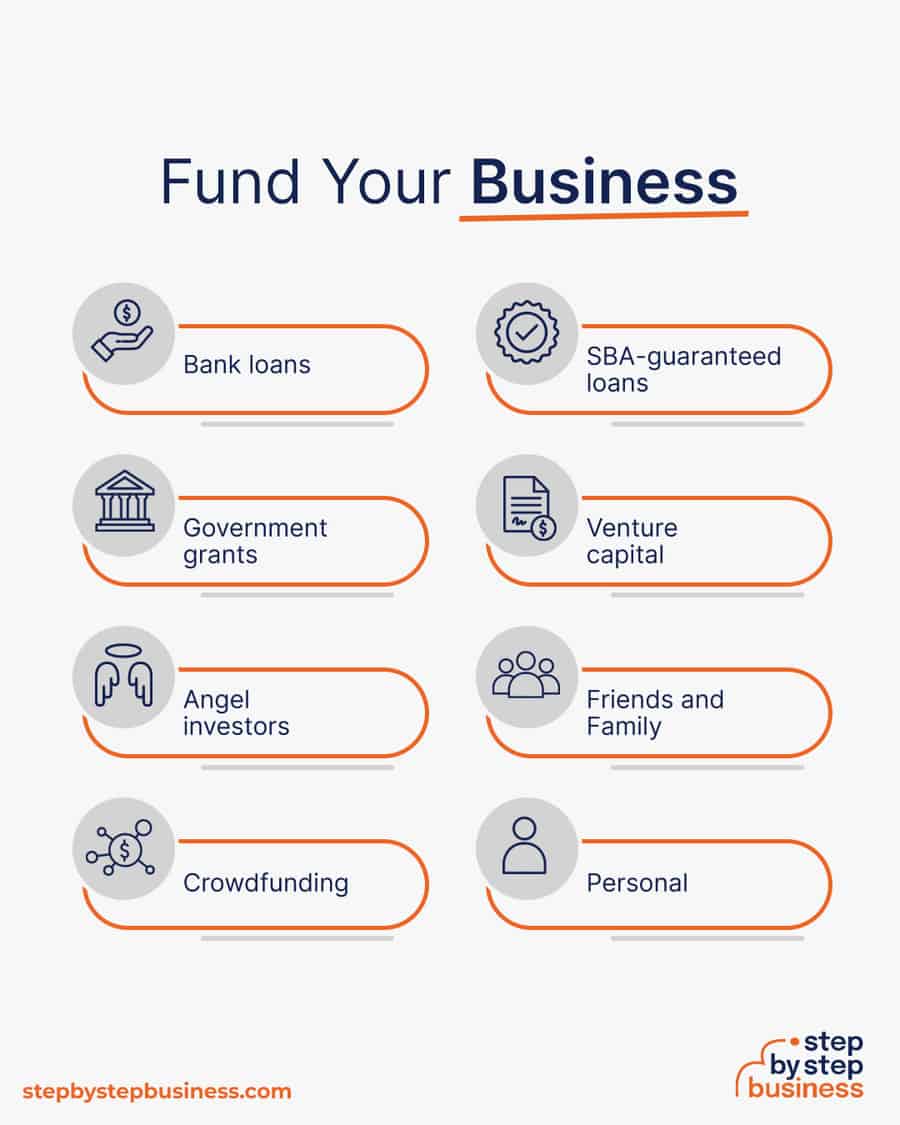
Step 8: Apply for Money Lending Business Licenses and Permits
Starting a money lending business requires obtaining a number of licenses and permits from local, state, and federal governments.
You’ll need to meet the requirements to be a licensed money lender in your state. You’ll also need to follow federal and state regulations on lending practices.
Federal regulations, licenses, and permits associated with starting your business include doing business as (DBA), health licenses and permits from the Occupational Safety and Health Administration ( OSHA ), trademarks, copyrights, patents, and other intellectual properties, as well as industry-specific licenses and permits.
You may also need state-level and local county or city-based licenses and permits. The license requirements and how to obtain them vary, so check the websites of your state, city, and county governments or contact the appropriate person to learn more.
You could also check this SBA guide for your state’s requirements, but we recommend using MyCorporation’s Business License Compliance Package . They will research the exact forms you need for your business and state and provide them to ensure you’re fully compliant.
This is not a step to be taken lightly, as failing to comply with legal requirements can result in hefty penalties.
If you feel overwhelmed by this step or don’t know how to begin, it might be a good idea to hire a professional to help you check all the legal boxes.
Step 9: Open a Business Bank Account
Before you start making money, you’ll need a place to keep it, and that requires opening a bank account .
Keeping your business finances separate from your personal account makes it easy to file taxes and track your company’s income, so it’s worth doing even if you’re running your money lending business as a sole proprietorship. Opening a business bank account is quite simple, and similar to opening a personal one. Most major banks offer accounts tailored for businesses — just inquire at your preferred bank to learn about their rates and features.
Banks vary in terms of offerings, so it’s a good idea to examine your options and select the best plan for you. Once you choose your bank, bring in your EIN (or Social Security Number if you decide on a sole proprietorship), articles of incorporation, and other legal documents and open your new account.
Step 10: Get Business Insurance
Business insurance is an area that often gets overlooked yet it can be vital to your success as an entrepreneur. Insurance protects you from unexpected events that can have a devastating impact on your business.
Here are some types of insurance to consider:
- General liability: The most comprehensive type of insurance, acting as a catch-all for many business elements that require coverage. If you get just one kind of insurance, this is it. It even protects against bodily injury and property damage.
- Business Property: Provides coverage for your equipment and supplies.
- Equipment Breakdown Insurance: Covers the cost of replacing or repairing equipment that has broken due to mechanical issues.
- Worker’s compensation: Provides compensation to employees injured on the job.
- Property: Covers your physical space, whether it is a cart, storefront, or office.
- Commercial auto: Protection for your company-owned vehicle.
- Professional liability: Protects against claims from a client who says they suffered a loss due to an error or omission in your work.
- Business owner’s policy (BOP): This is an insurance plan that acts as an all-in-one insurance policy, a combination of the above insurance types.

Step 11: Prepare to Launch
As opening day nears, prepare for launch by reviewing and improving some key elements of your business.
Essential software and tools
Being an entrepreneur often means wearing many hats, from marketing to sales to accounting, which can be overwhelming. Fortunately, many websites and digital tools are available to help simplify many business tasks.
You may want to use industry-specific software, such as HES , Black Knight , or Moneylender , to manage your loan processes, accounts, credit checks, and fees.
- Popular web-based accounting programs for smaller businesses include Quickbooks , Freshbooks , and Xero .
- If you’re unfamiliar with basic accounting, you may want to hire a professional, especially as you begin. The consequences for filing incorrect tax documents can be harsh, so accuracy is crucial.
Develop your website
Website development is crucial because your site is your online presence and needs to convince prospective clients of your expertise and professionalism.
You can create your own website using services like WordPress, Wix, or Squarespace . This route is very affordable, but figuring out how to build a website can be time-consuming. If you lack tech-savvy, you can hire a web designer or developer to create a custom website for your business.
They are unlikely to find your website, however, unless you follow Search Engine Optimization ( SEO ) practices. These are steps that help pages rank higher in the results of top search engines like Google.
Starting a money lending business can be lucrative, but success hinges on effective marketing strategies. Here are practical tips beyond creating a website and networking:
- Targeted Local Advertising: Utilize local newspapers, community bulletin boards, and radio stations to advertise your services, ensuring your message reaches the right audience within your community.
- Strategic Partnerships: Forge partnerships with local businesses like real estate agencies or car dealerships, creating a referral system where they recommend your lending services to their clients.
- Educational Seminars: Host free financial literacy seminars in your community to position yourself as an expert and attract potential borrowers seeking valuable insights into managing their finances.
- Social Media Engagement: Leverage social media platforms to engage with your audience, share financial tips, and create a community around your brand, fostering trust and credibility.
- Customer Testimonials: Showcase satisfied clients through testimonials in your marketing materials, emphasizing success stories and building credibility among potential borrowers.
- Loyalty Programs: Implement a loyalty program offering incentives or discounted rates for repeat borrowers, encouraging customer retention and word-of-mouth referrals.
- Direct Mail Campaigns: Design targeted direct mail campaigns to reach specific demographics, using compelling offers or promotions to capture the attention of potential borrowers.
- Online Reviews and Ratings: Encourage satisfied customers to leave positive reviews on online platforms, enhancing your online reputation and influencing potential borrowers in their decision-making process.
- Community Involvement: Actively participate in local events and sponsor community initiatives to increase your brand visibility and foster a positive image within the community.
- Referral Programs: Develop a referral program where existing customers are rewarded for referring new borrowers, creating a network of advocates who vouch for your services.
Focus on USPs
Unique selling propositions, or USPs, are the characteristics of a product or service that sets it apart from the competition. Customers today are inundated with buying options, so you’ll have a real advantage if they are able to quickly grasp how your money lending business meets their needs or wishes. It’s wise to do all you can to ensure your USPs stand out on your website and in your marketing and promotional materials, stimulating buyer desire.
Global pizza chain Domino’s is renowned for its USP: “Hot pizza in 30 minutes or less, guaranteed.” Signature USPs for your money lending business could be:
- Bad credit? We can put you back in the black
- Mortgage loan denied? We’ll finance your new home
- Affordable loans to build your business

You may not like to network or use personal connections for business gain. But your personal and professional networks likely offer considerable untapped business potential. Maybe that Facebook friend you met in college is now running a money lending business, or a LinkedIn contact of yours is connected to dozens of potential clients. Maybe your cousin or neighbor has been working in money lending for years and can offer invaluable insight and industry connections.
The possibilities are endless, so it’s a good idea to review your personal and professional networks and reach out to those with possible links to or interest in money lending businesses. You’ll probably generate new customers or find companies with which you could establish a partnership.
Step 12: Build Your Team
If you’re starting out small from a home office, you may not need any employees. But as your business grows, you will likely need workers to fill various roles. Potential positions for a money lending business include:
- Loan Processors – handle loan paperwork
- Loan Originators – take loan applications, get loan informational documents
- General Manager – scheduling, accounting
- Marketing Lead – SEO strategies, social media
At some point, you may need to hire all of these positions or simply a few, depending on the size and needs of your business. You might also hire multiple workers for a single role or a single worker for multiple roles, again depending on need.
Free-of-charge methods to recruit employees include posting ads on popular platforms such as LinkedIn, Facebook, or Jobs.com. You might also consider a premium recruitment option, such as advertising on Indeed , Glassdoor , or ZipRecruiter . Further, if you have the resources, you could consider hiring a recruitment agency to help you find talent.
Step 13: Run a Money Lending Business – Start Making Money!
Money lenders provide a valuable service to people unable to obtain loans, which is why it’s big business. If you can build solid relationships with investors and are committed to helping people, you could build a lucrative lending operation, even starting from your own home!
Now that you know what’s involved from a business perspective, it’s time to launch your successful money lending business.
- Money Lending Business FAQs
You can make a 3% to 5% fee on each loan amount, so it can be very profitable. The key is to build relationships with investors who will fund your loans.
Hard money lenders typically take a 3% to 5% fee of the total loan amount. The interest paid on the loans will go to the investors. The interest rates you charge will depend on the interest rate limits in your state.
To differentiate your money lending business, focus on providing competitive interest rates, flexible repayment terms, exceptional customer service, quick loan processing, transparency in fees and charges, and personalized financial solutions tailored to individual borrower needs.
Yes, you can start a money lending business on the side, but it requires careful consideration of legal and regulatory requirements, managing risk effectively, and ensuring proper time management and resources to handle both your main job and the lending business.
Assess the creditworthiness of potential borrowers by conducting thorough credit checks, verifying their income and employment stability, reviewing their credit history and repayment patterns, and considering any collateral or guarantors provided. Additionally, evaluate their debt-to-income ratio and analyze their financial statements to gauge their ability to repay the loan.
Expand your money lending business by developing strategic partnerships with local businesses or professionals, leveraging digital marketing strategies to reach a wider audience, offering referral incentives to existing clients, exploring new geographical regions or markets, providing online loan application and processing options, and continuously enhancing your reputation through positive customer reviews and testimonials.
This was a good guide for me , Thank you
Leave a Reply Cancel reply
Your email address will not be published. Required fields are marked *
Save my name, email, and website in this browser for the next time I comment.
- Decide if the Business Is Right for You
- Hone Your Idea
- Brainstorm a Money Lending Business Name
- Create a Money Lending Business Plan
- Register Your Business
- Register for Taxes
- Fund your Business
- Apply for Money Lending Business Licenses and Permits
- Open a Business Bank Account
- Get Business Insurance
- Prepare to Launch
- Build Your Team
- Run a Money Lending Business - Start Making Money!
Subscribe to Our Newsletter
Featured resources.
No thanks, I don't want to stay up to date on industry trends and news.
Contact Us for Financing Solutions
Atlantic Funding Co.
Have any Question?
844-AFC-LEND
Hard Money Business Loans: Your Gateway to Quick Financing with Atlantic Funding Co.

Traditional bank loans are often seen as the gold standard in the complex business financing landscape. Facing the cold shoulder from banks or tripping over strict lending criteria need not spell disaster for business ventures; in fact, hard money business loans shine as a beacon of practicality and advantage, offering a welcoming lifeline to a host of commercial enterprises in need. Atlantic Funding Co. specializes in bridging the gap between these businesses and the swift financial boost they require to thrive.
Understanding Hard Money Business Loans
At their core, hard money loans are short-term lending solutions secured by real estate. Unlike traditional loans, which evaluate a borrower’s creditworthiness as a primary factor, hard money lenders prioritize the value of the collateral property. This asset-based lending approach provides a lifeline for businesses needing immediate capital.
Who Needs Hard Money Loans?
Hard money loans are a type of asset-based financing that can be a lifeline for individuals or businesses that may not qualify for traditional lending methods for various reasons. These loans are typically provided by private investors or companies, with property or real estate often serving as collateral rather than creditworthiness or financial history. In essence, the following parties might find hard money loans particularly attractive:
- Real Estate Investors : This group often leverages hard money loans due to their quick approval timeframes and the heavy weight placed on the property’s value over the borrower’s credit. Real estate investors involved in house flipping or those looking to purchase, refurbish, and quickly sell property for profit often depend on hard money loans for their ventures.
- Businesses with Short-term Financing Needs : Companies needing immediate cash flow support might resort to hard money loans. They can often obtain these funds faster than a traditional bank loan and repay it once they secure longer-term financing or achieve the desired profit from a business endeavor.
- Individuals with Poor Credit or No Credit History : Unlike traditional lenders, hard money lenders focus more on the collateral’s value. Thus, those with weak or non-existent credit histories but substantial equity in their property can still secure financing.
- Property Buyers in Competitive Markets : In highly competitive real estate markets, offering an immediate closing can be advantageous. With their quick approval process, hard money loans can be instrumental in such situations.
- Businesses Facing Distressed Financial Circumstances : Companies facing closure due to cash flow constraints or entrepreneurs with businesses in distressed industries may find it nearly impossible to acquire loans from traditional lenders and, hence, may opt for hard money loans.
Advantages of Hard Money Loans with Atlantic Funding Co.
Quick Access to Funds: Time is of the essence in business operations, and the expedited processing times of hard money loans ensure that opportunities are not lost to lengthy bank loan approvals.
Credit Flexibility: With a focus on collateral rather than credit history, businesses with challenging credit histories find hard money loans more accessible.
Direct Approach: Atlantic Funding Co. minimizes traditional banking red tape, providing a more straightforward path to securing funding.
The Application Process through Atlantic Funding Co.
Applying for a hard money loan through Atlantic Funding Co. is designed to be as frictionless as possible. Here’s a broad overview:
- Submit an Application: A quick consultation call or apply online to help us understand your financing needs.
- Lender Match: We assess your application against lenders’ criteria and match your business needs with the best lender in our network.
- Loan Package Submission: After we receive interest from the lender for your business, we promptly gather the documents needed to submit a complete loan package to the lender.
- Get Funded: You’ll receive a loan offer detailing terms and conditions on approval and set up final steps to close the deal.
Our aim is to streamline the application process, allowing you to focus on what truly matters—your business’s growth.
How to Qualify for a Hard Money Loan
Eligibility for a hard money loan primarily hinges on the value of the real estate property you’re offering as collateral. However, a strong business plan and clear exit strategy can bolster your application. At Atlantic Funding Co., we’re keen on partnering with businesses that, despite potential financial adversities, show promise and determination.
Loan Usage and Repayment
Strategic use of hard money loans can significantly impact your business. The right approach is crucial, whether it’s seizing an investment opportunity, covering unexpected expenses, or facilitating growth spurts. Repayment plans are typically short-term, ranging from 12 months to a few years, offering flexibility and encouraging prompt financial restructuring.
Getting Started with Atlantic Funding Co.
Choosing Atlantic Funding Co. for your hard money business loan needs means partnering with a team genuinely invested in your success. Our customized lending solutions are designed to match your unique situation, providing the financial leverage necessary to overcome any hurdle.
Are you ready to unlock the potential of your business with a hard money loan? Fill out an application with Atlantic Funding Co. today and kickstart the conversation with our team. Start Your Application Now!

Ready to Take the Next Step?
Unlock Competitive Financing Options! Connect with Top Lenders through Our Application Process. Elevate Your Business – Apply Today!
Latest Post

Business Lending Solutions
- Hard Money Loans (2)
- Invoice Factoring (1)
Home > Finance > Loans
10 Best Hard Money Lenders: Our Favorite Bridge Loans for Flipping

Data effective 10/18/2022. At publishing time, amounts, rates, and requirements are current but are subject to change. Offers may not be available in all areas.

We are committed to sharing unbiased reviews. Some of the links on our site are from our partners who compensate us. Read our editorial guidelines and advertising disclosure .
A hard money loan offers a great short-term financing solution for rehabbing and flipping investment property. But unlike a traditional loan, you can't go to any old conventional lender to get one. Most traditional lenders don’t even offer hard money loans.
So where can you find them?
We have the answer. We’ve rounded up the best hard money lenders. In this article, we’ll talk about their benefits and limitations so you can find the right loan option for you.
- Flip Funding : Best overall
- Groundfloor : Lowest rates
- Kiavi : Fastest closing rates
- Residential Capital Partners : Lowest down payment
- CoreVest : Best line of credit
- Patch of Lending : Honorable mention
- Sherman Bridge Lending : Honorable mention
- Lima One : Honorable mention
- RCN Capital : Honorable mention
- Lending One : Honorable mention
What is a hard money loan?
A hard money loan, also called a "short-term bridge loan," is a type of loan usually given out by an individual or company — not a bank — for a real estate transaction. It is often a last-resort loan based on the value of the property you're buying.
Hard money loans are different than traditional loans in a few ways:
- The funding time is shorter.
- Hard money loans are not given by banks but by individuals.
- A hard money loan is riskier because credit worthiness isn't considered but the value of the property is.
How does a hard money loan work?
Hard money loans are usually used by property flippers who plan on buying a property, fixing it up and selling it very quickly. A hard money loan is helpful because closing is fast and you do not need a high credit score because you are not getting the money from a bank. Instead the loan comes from an individual who gets to set the terms.
A hard money loans has to be paid off quickly (usually within one to three years). If the borrower does not pay it off, the lender can take the property, which was used as collateral .
With traditional loans, a high credit score typically means you have a better chance at a larger loan and a lower interest rate. The terms are set and tend to be rigid. With hard money loans, the terms are more flexible. You may be able to re-negotiate payment terms throughout the loan.
Traditional loans are regulated because they are offered by banks. With very few regulations, anyone willing to loan hard money can arrange the transaction as they see fit — which may not be advantageous for you. Consider shopping around if you can and comparing offers.
Pros and Cons of hard money loans
What do hard money lenders require.
Different hard money lenders have different loan requirements , but there are a few things they usually look at.
Since your property doubles as collateral for your loan, they’ll usually want to know about your specific property and project. That’s why an appraisal (among other things) is a typical part of the funding process. They may also ask about your specific rehab plans.
Some hard money lenders may also require you to have flipping experience. While you can find lenders willing to work with first-time flippers, the best deals are usually reserved for experienced rehabbers.
Then there’s the financial side of things. Some hard money lenders have specific income or liquid asset requirements. (Basically, they want you to have money in the bank). And most lenders will check your credit. However, they don’t all have a specific credit score requirement.
Finally, pretty much all lenders will require you to have an actual business (usually an LLC) to get funded. They don’t fund individuals. That means you’ll also need a business bank account .
Of course, your specific lender will walk you through their own requirements.
What fees should I expect with hard money financing?
A commercial hard money loan will often have an origination fee, which is a percentage of the total loan amount. Hard money financing also comes with closing fees, just like any other real estate loan. This can include appraisal fees, title fees and insurance fees.
Some hard money loans come with a prepayment penalty. Be careful when getting one of these. Remember, hard money loans come with high interest rates because they’re designed to be paid off or refinanced ASAP after finishing a project. You don’t want to get a nasty (and costly) surprise when that time comes.
How do I find a good hard money lender?
If you want to find a good hard money lender, take a look at our recommendations below. We’ve found some great options.
Wondering how to compare hard money lenders? You’ll want to look at a number of factors:
- Loan amounts
- Interest rates
- LTV (loan-to-value) and ARV (after repair value) percentages
- Minimum time to closing
- Down payment
- Prepayment penalty (if any)
You’ll also want to make sure your hard money lender of choice operates in your area (most have at least a few state restrictions) and funds your type of project (townhome, condo, single-family home, etc.).
Compare the best hard money lenders
LTV and ARV both tie into the loan amount you can get. LTV (loan-to-value) means the current value of the property you’re buying, while ARV (after repair value) indicates how much the property will be worth after rehabbing. A lender will use these values to calculate how much money you qualify for.
By signing up I agree to the Terms of Use.
Flip Funding: Best overall
Flip Funding offers enough versatility to work for all sorts of property projects, making it our favorite hard money lender overall. As you may know, many hard money lenders only fund a particular type of project. Flip Funding, on the other hand, has loan programs for all sorts of property projects.
For example, its Fix and Flip term loan lets you purchase and rehab property, just as you’d expect. But if you have land you want to build on, its New Construction loans offer funding for that. Likewise, if you already own a property and just need the funds, you can turn to Flip Funding’s Rehab loan. It’s also got loans for multi-family, mixed-use, and even commercial property projects.
Flip Funding loan details
That flexibility is far from Flip Funding’s only redeeming quality, though. It also offers competitive rates, a relatively fast closing time, and low minimum down payments. Yes, other lenders may do better at each of those things individually (as you’ll see in the reviews below), but few do it all as well as Flip Funding does.
That makes Flip Funding the best hard money lending for most people.
Groundfloor: Lowest rates
Groundfloor has an obvious advantage over the other hard money lenders: lower starting interest rates.
Groundfloor’s rates start off some 6% lower than other lenders. Even its maximum interest rate is just 18%. Sure, that’s probably higher than you’d hope to get, but it’s a lower maximum than you’ll find at many lenders (even for traditional term loans).
Groundfloor loan details
The catch? Getting a low rate from Groundfloor isn’t the easiest. Your rates and terms depend on several factors, including your experience as a rehabber and the details of the flipping project itself. And Groundfloor has pretty strict guidelines for what kinds of projects it funds.
For example, only single-family or one-to-four-unit projects qualify―no larger multifamily, commercial, construction, or other projects.
So if experience and an eye for good projects, Groundfloor offers your best chance at low-interest rates.
Kiavi: Fastest closing time
Sometimes, you just need your loan funds ASAP. That’s when Kiavi comes in handy.
Kiavi has the shortest possible time to closing we’ve seen―as little as five days. For reference, Groundfloor and Residential Capital Partners both have a minimum turnaround time of two weeks, and CoreVest’s is even longer. So Kiavi's five days really stand out. It means you can take advantage of even the most time-sensitive of opportunities.
Kiavi's loan details
Now, that short time frame does come with caveats. You, as a borrower, need to get all your documents in pronto and be super responsive after submitting your loan application. Plus, Kiavi offers that five-day time frame to only experienced flippers. So first-timers (all the way to fourth-timers) should expect closing to take longer—around 10 days. You can probably expect Kiavi to take less time than other hard money lenders.
If you don’t have any time to spare, then Kiavi’s turnaround speed makes it the best lender for you.
Residential Capital Partners: Lowest down payment
You've probably heard the saying it takes money to make money, but sometimes you want it to take just a little less money to get started. Fortunately, Residential Capital Partners understands.
Residential Capital Partners offers hard money loans starting at a 0% down payment. Other lenders ask for anywhere from 10% to 20%, which can add up quickly (especially if you’ve got a big project in mind). But Residential Capital Partners offers its down payment–free deal to all its borrowers.
Residential Capital Partners loan details
Yes, you’ll still have to pay closing costs (title insurance, property insurance, and appraisal fees). And depending on your flipping experience and financial qualifications, Residential might offer you a lower percentage of the property’s ARV (after repair value) than other lenders would.
If you want to save money on a down payment, Residential Capital Partners lets you do exactly that.
CoreVest: Best line of credit
Many lenders offer hard money loans (like the 10 on this list), but not many offer a hard money line of credit. CoreVest does.
In addition to its usual bridge loan, CoreVest has a Fix and Flip line. It works just like a business line of credit . That means you can draw from it, repay your draw amount, and draw again. In other words, you won’t have to reapply for a new commercial hard money loan every time you start a new project―instead, you can just draw from your Fix and Flip line.
CoreVest loan details
Keep in mind that these lines start at $1 million. So if you mainly deal in smaller projects, CoreVest’s line might be overkill. (You can always apply for its bridge loan instead.) Note also that CoreVest looks for borrowers that have completed at least a couple of projects. So brand-new flippers should look for a different lender.
But if you have lots of projects coming your way, CoreVest’s Fix and Flip line offers a convenient way to finance them.
Honorable mentions
Patch lending.
Patch Lending is an unusual hybrid of lending and crowdfunding. Patch Lending initially funds your hard money loan, but then it invites investors to crowdfund the loan amount in return for interest. It’s an exciting model, and borrowers seem to like Patch Lending overall.
That said, it’s not the cheapest or fastest lender out there. Plus, we’ve seen some grumbling from dissatisfied investors, which makes us worry about Patch Lending's future. That shouldn’t necessarily keep you from borrowing, but it does keep Patch Lending from being one of our top picks.
Sherman Bridge Lending
Sherman Bridge Lending offers perfectly good hard money loans with reasonable rates and turnaround times. There’s a lot we like about it, and we’d happily recommend it to many borrowers.
So why is it only an honorable mention? Well, Sherman Bridge has some of the more restrictive hard money loans out there. You can only use them to fund projects for single-family or two-to-four-unit projects. Plus, it doesn’t deal with first-time flippers. That means Sherman Bridge isn’t as well-rounded or competitive as other lenders. It’s still a solid choice, but it’s not our favorite.
Lima One offers pretty low-interest rates compared to most hard money lenders on this list. So if saving on interest matters to you but Groundfloor doesn’t work, Lima One provides a good alternative.
Just note that Lima One places some restrictions on first-time flippers. For example, they can’t qualify for all of its loan types. Also, Lima One offers lower percentages of both LTV (loan-to-value) and ARV (after repair value) than other lenders, so you may get less money overall.
RCN Capital
RCN Capital is another hard money lender that’s good but not quite competitive enough. Take its interest rates. Sure, they’re reasonable—but far from the lowest we’ve seen.
Throw in the fact that first-time flippers can qualify for only some loans, plus prepayment penalties on some loans, and RCN Capital lands squarely in honorable mention territory. In other words, it’s fine, but it’s not the best.
Lending One
If we’re being honest (we are), we think Lending One has a lot to offer, but we don’t know that for sure. Its website is woefully lacking in information. Crucial data such as interest rates, maximum loan amounts, ARV, down payments, and more are all missing. But it does invite you to call for more information.
That sort of coy invitation is annoying at the best of times (why not put the information on the internet?). But when we try to call and then have to leave a message without getting any answers, it’s downright obnoxious. We’re still including it because we’ve read good things. Just know that you’ll have to confirm that for yourself because we, unfortunately, couldn’t.
Alternatives to hard money loans
If a hard money loan feels too risky for you, don't worry. We have alternatives.
Commercial bridge loans are the closest alternative to a hard money loan. Both loans are similar in that they are short-term loans with large origination fees and high interest.
The biggest difference is that they are given by traditional banks making bridge loans safer than hard money loans.
Crowdfunding is a good standard and becoming more and more popular. Essentially, crowdfunding is exactly what it sounds like — you are funding your real estate loan via a crowd of people.
There are different platforms where you can state your financial goals and the people who want to support your business can donate. The popular platforms include Kickstarter, GoFundMe, and Patreon. These platforms are often reward based and may not be a good alternative for a hard money loan.
Good news for you! There are platforms that work for businesses and not creative projects or healthcare donations. This is called equity crowdfunding and it can be great way of raising funds without having to deal with hard money lenders.
Peer-to-peer loans are loans by an individual investor instead of a credit union or bank.
Peer-to-peer loans are not as risky as hard money loans because, even though they are individuals lending money similar to a hard money loan, they are highly regulated and usually do business through different lending platforms like Funding Circle or StreetShares .
Another difference between hard money lenders and P2P lenders is that lender never personally interacts with the borrower in a P2P loan. The lending platform mediates the transaction and makes sure everything is done on above board.
The takeaway
With a hard money loan from the lenders above, you can get the cash you need to buy and improve a property. So no matter what your priority is―whether it’s a fast closing or a low-interest rate―we’ve found a hard money lender for you.
Now it’s up to you to apply for your loan and complete your project―and (hopefully) make a tidy profit along the way.
Before you accept a hard money loan, make sure you understand how much your hard money loan will cost by using our commercial loan calculator .
Enter your loan needs and qualifications to get matched with a list of lenders best suited to you. Then, sort by the financing factor that you find most important. ( Note : not all lenders allow personal loans for business use.)
Related reading
- Best Commercial Real Estate Loans 2023
- Commercial Bridge Loans: A Stopgap Real Estate Financing Solution
- Commercial Real Estate Loan Rates
- Types of Commercial Loans for Real Estate and Beyond
- A Guide to Commercial Real Estate Loans
FAQ about hard money lenders
As we said above, many hard money lenders don’t have specific credit requirements. Your credit score is just one piece of their approval puzzle, and some lenders don’t place much importance on it. (Instead, they care a lot about your liquidity and experience.)
So if you have bad credit, it's not necessarily the end of the world.
That said, hard money lenders that care about personal credit scores usually look for something in the 600s. A 600 personal credit score is the lowest requirement we’ve seen.
Hard money loans are short-term real estate loans meant for real estate investment―specifically flipping properties.
They have short repayment terms (usually less than three years) and relatively high-interest rates than other commercial real estate loans . That’s because hard money loans are designed to be paid off quickly, when a borrower sells or refinances a flipped property.
Hard money financing goes by many names, so you may also hear it referred to as a bridge loan, rehab loan, or flip loan―among other things.
You can learn more about hard money loans in our guide to commercial bridge loans .
At Business.org, our research is meant to offer general product and service recommendations. We don't guarantee that our suggestions will work best for each individual or business, so consider your unique needs when choosing products and services.

5202 W Douglas Corrigan Way Salt Lake City, UT 84116
Accounting & Payroll
Point of Sale
Payment Processing
Inventory Management
Human Resources
Other Services
Best Small Business Loans
Best Inventory Management Software
Best Small Business Accounting Software
Best Payroll Software
Best Mobile Credit Card Readers
Best POS Systems
Best Tax Software
Stay updated on the latest products and services anytime anywhere.
By signing up, you agree to our Terms of Use and Privacy Policy .
Disclaimer: The information featured in this article is based on our best estimates of pricing, package details, contract stipulations, and service available at the time of writing. All information is subject to change. Pricing will vary based on various factors, including, but not limited to, the customer’s location, package chosen, added features and equipment, the purchaser’s credit score, etc. For the most accurate information, please ask your customer service representative. Clarify all fees and contract details before signing a contract or finalizing your purchase.
Our mission is to help consumers make informed purchase decisions. While we strive to keep our reviews as unbiased as possible, we do receive affiliate compensation through some of our links. This can affect which services appear on our site and where we rank them. Our affiliate compensation allows us to maintain an ad-free website and provide a free service to our readers. For more information, please see our Privacy Policy Page . |
© Business.org 2023 All Rights Reserved.
- Your Success is our GOAL!
- 1-607-216-1995

- Commercial Hard Money Loan
Definition:
Commercial Hard Money Loans are through various funding entities who provide funding to businesses in need of capital to start-up a company, expand an existing company, debt consolidation or for operating capital. Commercial Hard Money Loans are usually obtained at a higher interest rate than conventional loans and may have specific terms attached to the loan.
The Problem:
Obtaining Commercial Hard Money Loans can be difficult for any type of business if the correct credit isn’t there.
The Solution:
The IRA Network works with numerous Commercial Hard Money Lending institutions who provide Commercial Hard Money Loans.
Funding Range:
$150,000 – $1,000,000
Understanding Your Needs:
The IRA Network understands the need for Capital Funding NOW. We know that the harder it is to obtain capital and the longer it takes the easier you can be discouraged from realizing your dreams of opening a business or expanding your existing business.
We Can Help!
The IRA Network specializes in both Conventional and Hard to Fund projects that require a creative funding approach. IRA has created a unique relationship between entrepreneurs and investors. In order for us to determine how we can assist you in finding the right investor relationship for your project, please fill out the following. To analyze the information properly, we have asked specific questions regarding your business and/or project. The IRA Network understands entrepreneurs are traditionally risk-takers and usually have put their own credit and finances at risk, hurting their credit.
Please be advised that your answers to the questions regarding your credit and finances have no bearing on whether or not we take you on as a client, but rather serves as an aid in analyzing your total situation and in developing the right funding strategy. Additionally, if you don’t know an answer – don’t worry – this isn’t a test.
After one of our analysts has had an opportunity of review you responses, we will get back to you to evaluate your project and establish a plan of action. Funding Pre-Qualifier – Let the Professionals take care of your capital needs!!!
- Privacy Overview
- Strictly Necessary Cookies
- Privacy Policy
This website uses cookies so that we can provide you with the best user experience possible. Cookie information is stored in your browser and performs functions such as recognising you when you return to our website and helping our team to understand which sections of the website you find most interesting and useful.
Strictly Necessary Cookie should be enabled at all times so that we can save your preferences for cookie settings.
If you disable this cookie, we will not be able to save your preferences. This means that every time you visit this website you will need to enable or disable cookies again.
More information about our Cookie Policy
From Idea to Foundation
Master the Essentials: Laying the Groundwork for Lasting Business Success.
Funding and Approval Toolkit
Shape the future of your business, business moves fast. stay informed..

Discover the Best Tools for Business Plans
Learn from the business planning experts, resources to help you get ahead, hard money loan, table of contents.
Coming Soon!

Welcome to Businessplan.com
Currently in beta test mode.
Products available for purchase are placeholders and no orders will be processed at this time.
Let’s craft the ultimate business planning platform together.
Have questions, suggestions, or want a sneak peek at upcoming tools and resources? Connect with us on X or join “On the Right Foot” on Substack .
This site uses cookies from Google to deliver its services and to analyze traffic.
Ok, Got It.
Privacy Policy

IMAGES
VIDEO
COMMENTS
Second Fiscal Year (FY2): (15% of revenue generated) Third Fiscal Year (FY3): (20% of revenue generated) d. Profit Margin of a Hard Money Lending Company Business. The profit margin of a hard money lending company business is not fixed. It could range from 5 percent to 20 percent depending on some unique factors.
A business plan is a document that lays out a company's strategy and, in some cases, how a business owner plans to use loan funds, investments and capital. It demonstrates that a business is ...
Hard money loans are based on the value of the subject property, which serves as collateral, not your credit score. So if a property's market value is $500,000, and you're able to borrow up to 70% in the form of a hard money loan, the loan would be worth $350,000. This is the loan-to-value ratio (LTV)—a percentage of the property's value.
1. Complete all the above steps, coupled with a discussion with legal on the documents required to raise capital for your business. You need to determine in what states you will be seeking ...
Banks and credit unions might loan you 80%-90% of the collateral's face value. Hard money loans might have an LTV of 65%. For example, suppose you are taking out a hard money business loan against real property appraised at $150,000. The hard money lender would then issue you a loan for 65% of that value, or $97,500.
To avoid taking on too much risk, the lender decides to offer you a $65,000 loan. That would make your LTV 65%: $65,000 / $100,000 = 0.65, or 65%. Hard money lenders typically offer loan amounts ...
A hard money business loan is a secured loan that uses a company's property or assets as collateral. Hard money business loans usually have high interest rates and short repayment periods, like ...
A hard money business loan is a type of secured business loan where property acts as collateral to finance the loan. Because hard money loans often have quick repayment schedules and can have higher interest rates, they are somewhat similar to short-term or bridge loans. Because hard money loans focus on the value of the property and typically ...
Second, hard money loans are used primarily for flipping properties. Most borrowers plan to pay off the loan as quickly as possible, either through selling the property or through refinancing with a better loan. As a result, hard money loans have very short terms. That said, hard money loans have some key advantages.
However, because a hard money business loan is reliant on a significant amount of collateral, you'll expect to have higher loan-to-value ratios with these financial products. As an example, if you're offering up collateral that's worth $100,000, a lender won't want to issue a $100,000 loan. Instead, they may offer you $70,000.
Navigate the Requirements for Hard Money Business Loans: 3 Must-Knows. Master the essentials to unlock swift, asset-based financing. Click to learn more ... your ability to meet the lender's requirements for hard money business loansmand provide a solid repayment plan. Applying for a Hard Money Loan Made Easy.
Lenders want clarity on how you plan to repay the loan, such as through property sales, refinancing, or another viable method. ... On the other hand, a hard money business loan is for business purposes, usually related to real estate, and business assets or real estate secure it. ; Related Articles. 20 Feb 2024
A hard money loan is a type of financing based on the value of some collateral, usually real estate, the borrower offers up. A private lender will offer a loan as a percentage of the asset's appraised value. "What a hard money loan does is allow a company or individual to turn a real estate asset to cash, which they could use for any legal ...
Startup costs, outside of raising capital, usually range from $50,000 to $150,000 covers the working capital, professional fees, licensure, and initial marketing costs that are required in order to watch this type of lending business. A hard money lender business plan usually focuses on the closing fees and interest is charged to borrowers in ...
2. Check Your Eligibility. Although business loan requirements vary, here are four things lenders are likely to consider when reviewing your small business loan application: Credit score. When you ...
Many of the qualities you need to be a hard money lender are the same as what you need to succeed in other startup businesses: hard work, networking, dedication, and planning. A few startup numbers: According to the U.S. Bureau of Labor Statistics, about 20% of new businesses fail in their first year.
How much can you earn from a money lending business? Hard money lenders typically take a 3% to 5% fee of the total loan amount. Since a large portion of the loans you make will be for homes, these calculations will assume an average loan amount of $150,000, which would give you an average fee of $6,000 per loan.
Understanding Hard Money Business Loans. At their core, hard money loans are short-term lending solutions secured by real estate. Unlike traditional loans, which evaluate a borrower's creditworthiness as a primary factor, hard money lenders prioritize the value of the collateral property. ... However, a strong business plan and clear exit ...
For example, RCN Capital requires a FICO score of 660 for short-term hard money loans. Solid business plan. When applying for a hard money loan, you may also need to provide the lender with your ...
A Hard Money Loan is usually obtained at a higher interest rate than conventional loans and may have specific terms attached to the loan. The Problem: Obtaining Hardy Money Loan can be difficult for any type of business if the correct credit isn't there. The Solution: The IRA Network works with numerous Hardy Money institutions who provide ...
Many lenders offer hard money loans (like the 10 on this list), but not many offer a hard money line of credit. CoreVest does. In addition to its usual bridge loan, CoreVest has a Fix and Flip line. It works just like a business line of credit. That means you can draw from it, repay your draw amount, and draw again.
Commercial Hard Money Loans are usually obtained at a higher interest rate than conventional loans and may have specific terms attached to the loan. The Problem: Obtaining Commercial Hard Money Loans can be difficult for any type of business if the correct credit isn't there. The Solution: The IRA Network works with numerous Commercial Hard ...
Optimize your business plan with AI, utilizing it in conjunction with the Model-Based Planning™ worksheet, crafting compelling narratives, analyzing market and industry trends, and forming key assumptions in your financial models ... Hard Money Loan. Generic selectors. Exact matches only Search in title Search in content Post Type Selectors ...